 09/12/2008 10:53 09/12/2008 10:53 |
|
| | | OFFLINE | | Post: 15.921 | Registrato il: 28/08/2005
| Utente Gold | |
|
 Russia buries Patriarch
Russia buries Patriarch
in grand funeral
By Dmitry Solovyov and Oleg Shchedrov

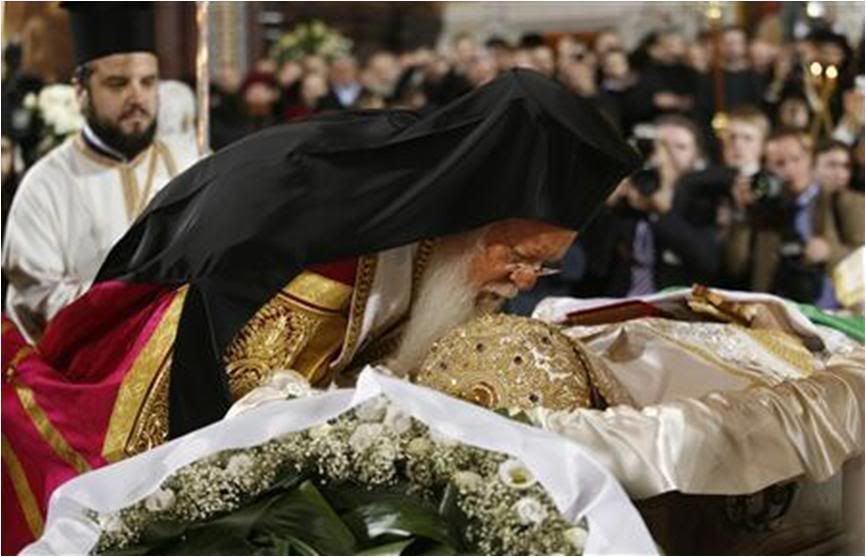
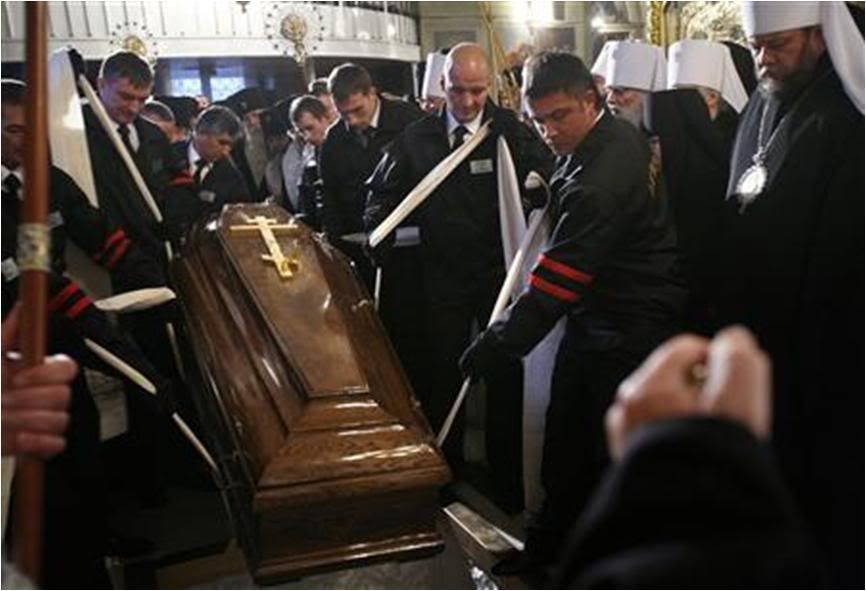 Top photo, Ecumenical Patriarch Bartholomew I pays his last respects to Alexei-II; above, the late Patriarch is laid to rest in a crypt at the Epiphany Cathedral.
Top photo, Ecumenical Patriarch Bartholomew I pays his last respects to Alexei-II; above, the late Patriarch is laid to rest in a crypt at the Epiphany Cathedral.
MOSCOW, Dec. 9 (Reuters) - Russian Orthodox Patriarch Alexiy II was buried on Tuesday after a long and elaborate funeral ceremony at which he was praised for reviving the nation's Christian faith after decades of communist rule.
State broadcasters canceled normal programing to broadcast live the half-day ceremony for Alexiy, who died on Friday aged 79 after 18 years leading the world's biggest Orthodox church.
Thousands of ordinary Russians lined the streets of Moscow to see the coffin pass as bells tolled. Some mourners wept.
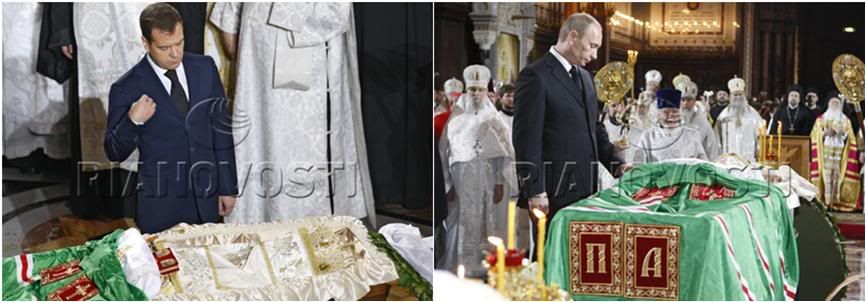
President Dmitry Medvedev and Prime Minister Vladimir Putin, in black suits and black ties, attended the funeral. Both kissed Alexiy's robed body on a catafalque surrounded by white roses in the heart of Moscow's gold-domed Christ the Saviour Cathedral.
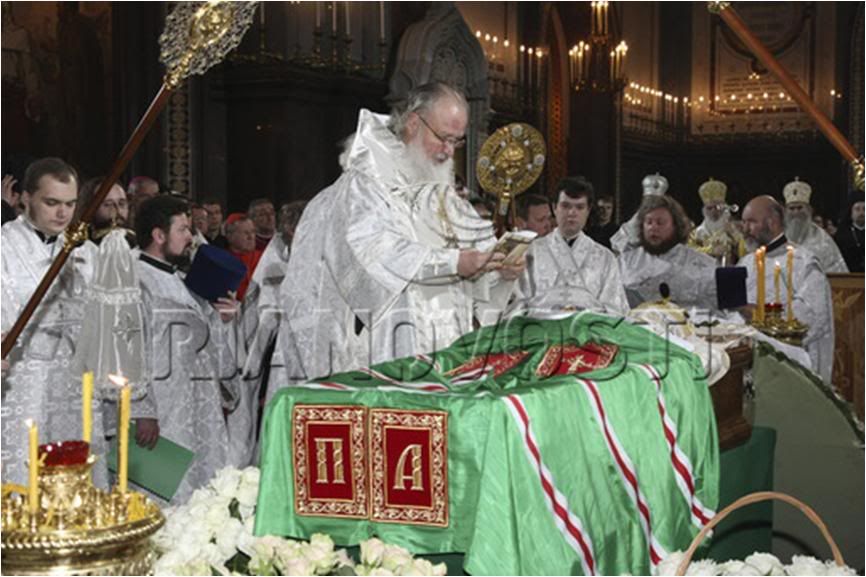
"He spoke in the language of eternity, he understood that only love could unite people," the church's interim leader, Metropolitan Kirill, said in a speech delivered beside the coffin, which was draped in a green, red and white shroud.
Kirill, 62, was helped away by aides at one point during the lengthy ceremony. The Church said he was in good health and had not fainted, and he subsequently rejoined the funeral.
Orthodox patriarchs and metropolitans (senior bishops) from Russia and abroad stood in the vast cathedral as priests chanted the liturgy, followed by funeral rites.
Archpriest Dimitry Smirnov, head of the Patriarchy's department for cooperation with the army and law enforcement forces, praised Alixiy's role in the church's revival after the Soviet Union collapsed in 1991.
"The number of churches multiplied to 30,000 and the number of monasteries to 700 from 18 (under Alexiy)," he said. "This is a fantastic number, so fantastic it is difficult to believe, but it is true."
Alexiy's opponents say he allowed the church to become a junior partner of the Kremlin when Putin was president, and the Patriarch failed to shake off allegations he worked as an informer for the Soviet KGB. The church denied this.
The presidents of Moscow's close allies Belarus, Armenia and Serbia, at least 11 Russian cabinet ministers, top Kremlin officials and leading businessmen also attended the funeral.
Cardinal Walter Kasper, head of the Vatican's Pontifical Council for Christian Unity, led a delegation from Rome, with whom the Russian Church has at times had strained relations.
Throughout the funeral, the coffin lay in the center of the cathedral, which was rebuilt in the 1990s after being destroyed by Soviet leader Josef Stalin.
At the catafalque's head stood a floral display depicting the Orthodox cross with its extra two bars.
As the ceremony ended, top clergy said prayers for Alexiy's soul and lined up to file past the coffin and kiss him farewell.
The coffin was carried out of the cathedral over a path of white roses, said to be his favorite flower.
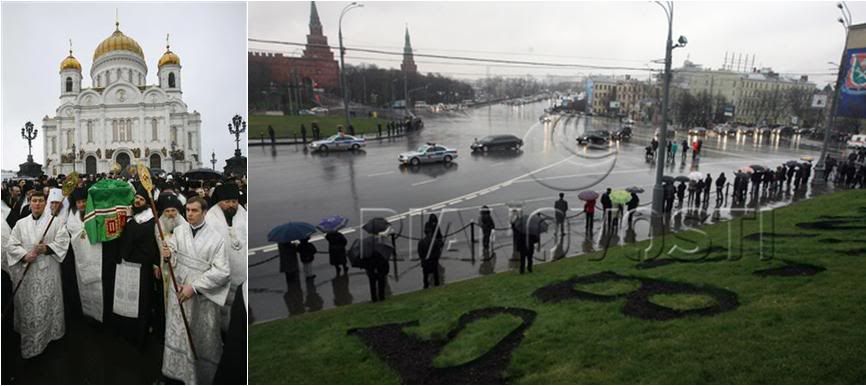
A black hearse drove the body in a convoy escorted by police through the cold, rainy streets to the 18th-century Epiphany Cathedral, where Alexiy was laid to rest in a private ceremony.
"I feel today that a great saintly man has left us. I hope he will pray for Russia when in heaven. I attended his sermons and he was such an approachable and simple man in his everyday life," pensioner Olga Larchenko said.
Kirill, whose official title is Metropolitan of Smolensk and Kaliningrad, was chosen by a 12-man Holy Synod of top church leaders as interim leader last Saturday.
The Holy Synod will on Wednesday announce a date for convening the Local Council, a body of the Russian Orthodox Church hierarchy and laity which will choose a new Patriarch.
Funeral for Alexei-II
By MANSUR MIROVALEV

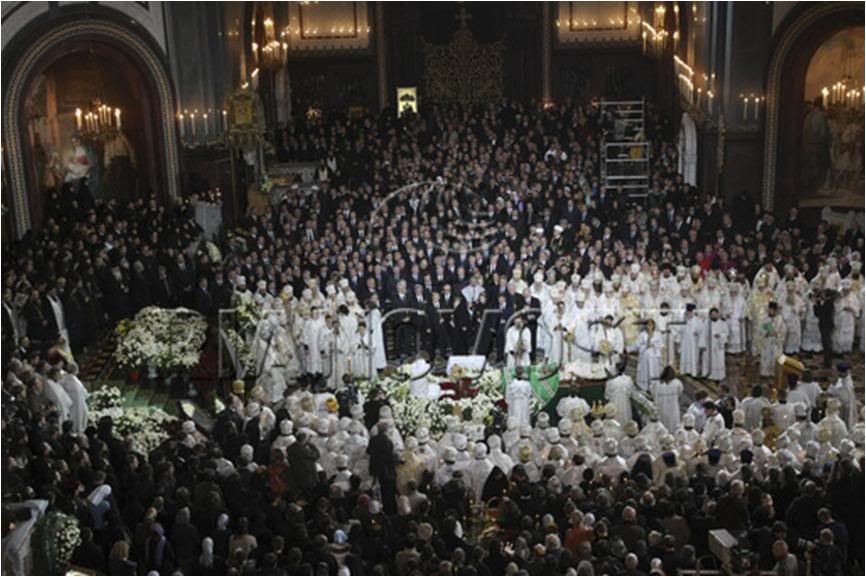
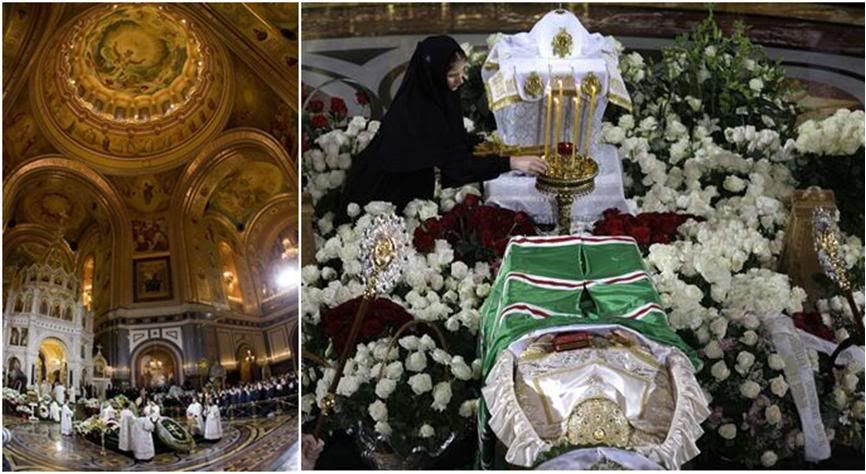
MOSCOW, Dec. 9 (AP) — Candles flickered and white-robed elders chanted prayers as Russia bade farewell Tuesday to Patriarch Alexy II, who guided the country's dominant Russian Orthodox Church through its remarkable recovery after decades of Communist-era oppression.
Nuns, believers and government officials looked on as prayers filled the soaring Christ the Savior Cathedral at the funeral ceremony for Alexy, who died Friday at age 79. He was to be buried later in the day at Epiphany Cathedral across town.
Chosen as Patriarch a year before the 1991 collapse of the officially atheist Soviet Union, Alexy shaped the church's powerful growth — and a renewal of its traditionally close ties with the Russian state — through the turbulent years that followed.
"We are burying a great man, a great son of our nation, a beautiful holy fruit grown by our Russian church," Rev. Dmitry Smirnov, a Moscow archpriest, said in an address at the funeral, which was broadcast live on state-run television. "Our whole nation has been orphaned."
Tuesday's funeral followed nearly three days of around-the-clock viewing of the Patriarch's body, with 80,000 people lining up outside the cathedral and waiting hours in the rain to file past his coffin and pay their last respects.
Alexy's body lay in an open casket surrounded by flowers and candles in the cathedral near the Kremlin, his face and body covered by a white-and-gold embroidered cloth.
The opulent, hours-long ceremony mirrored services Alexy himself led at Christ the Savior: The glittering robes, incense smoke, the prayers and the upturned faces of the faithful.
It was led by Alexy's temporary replacement, Metropolitan Kirill, a top contender to become the next Patriarch. That decision may not come for months, however.
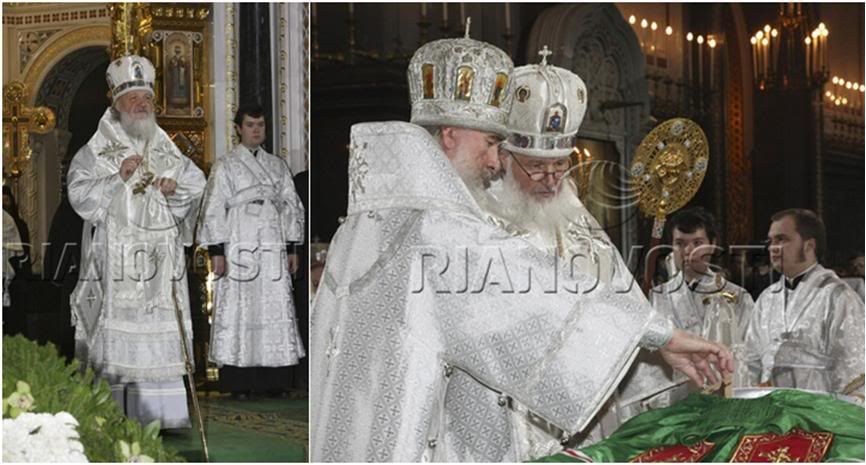
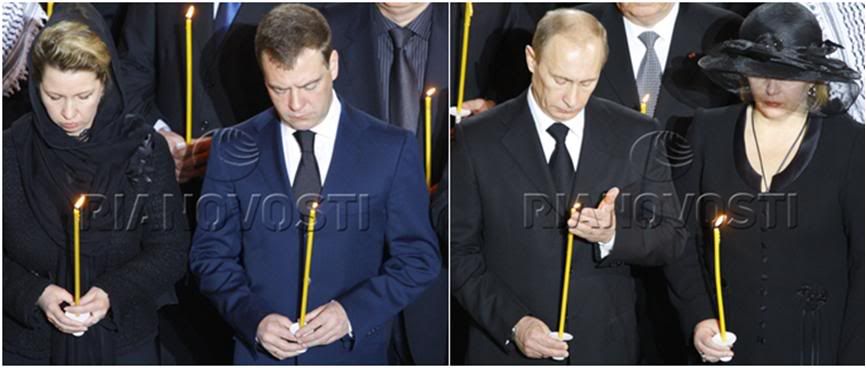
President Dmitry Medvedev and Prime Minister Vladimir Putin attended with their wives, arriving about three hours after the ceremony began.
Other Orthodox Christian leaders also came to bid farewell to the leader of the Orthodox world's largest church, and the Vatican sent a high-level delegation.
Smirnov said Alexy was primarily responsible for the revival of the Russian Orthodox Church, which claims about two-thirds of Russia's 142 million people as its flock and also controls Orthodox churches in several ex-Soviet republics.
He said that under Alexy, the number of monasteries — including small outfits with a handful of monks — had increased from 18 to more than 700. The church also says that the number of houses of worship has risen from fewer than 7,000 in 1988 to nearly 30,000 today.
"He was a true builder of the Church," Smirnov said.
The coffin arrives at Epiphany Cathedral, where the Patriarch was laid to rest; Metropolitan Kirill is shown in center photo arriving at the Cathedral.
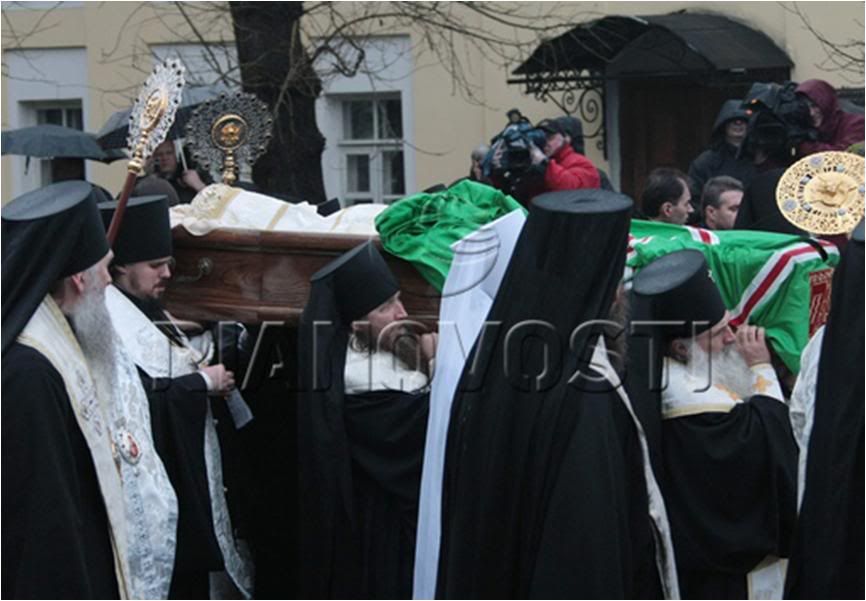
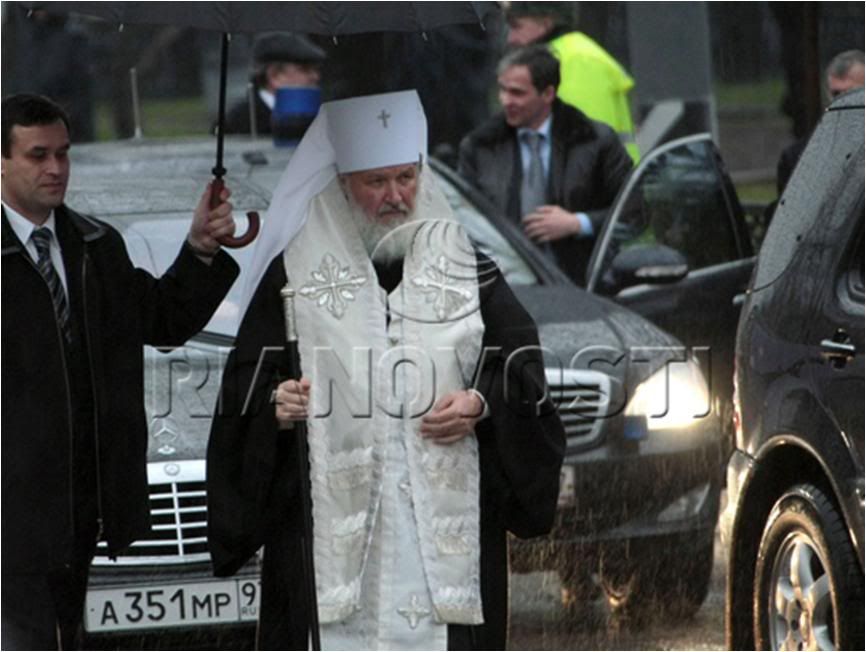
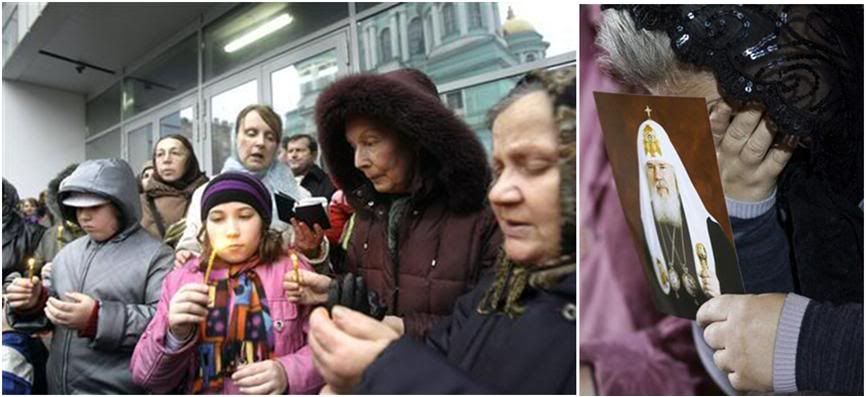
* * * * * * * * * * * * * * * * * * * * * * * * * * * * * * * * * * * * * * * * * * * * * * * * * * * * * * * * *
The funeral of Alexei II
Translated from
the 12/9-12/10 issue of

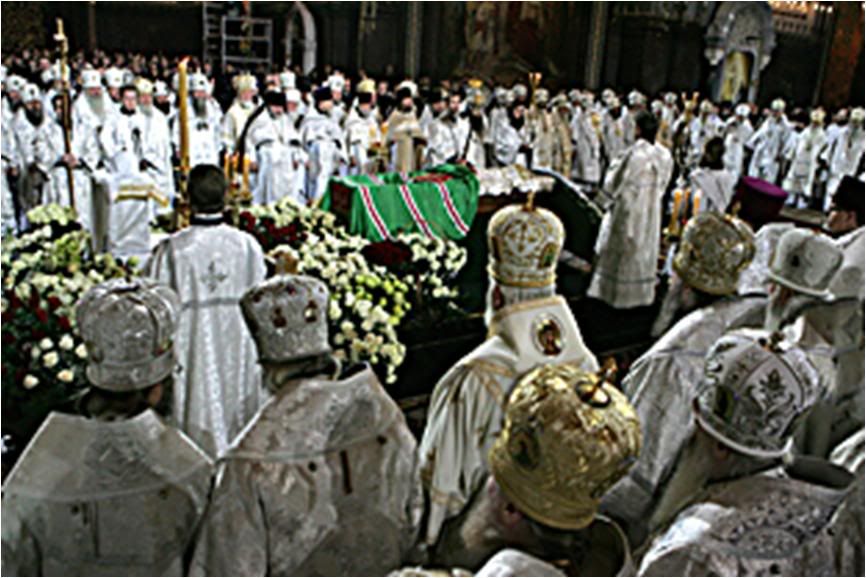
MOSCOW, December 9 - Funeral rites for the Patriarch of Moscow Alexei II were celebrated this morning at the Cathedral of Christ the Savior.
The religious service began with a closed-door rite at which only the Patriarchs of all Orthodox Churches, representatives of other religions and political representatives from foreign countries took part, along with Russian President Dmitri Medvedec and Prime Minister Vladimir Putin.
Among the guests were Patriarch Bartholomew I of Constantinople, the Catholicos og Georgia, Ilia II; the Catholicos of all Armenia Gareghin II; the Patriarch of Romania, Danil I; the Metropolitan of all the Czech lands and Slovakia, Krystof; the Archbishop of Tirana Durres and the Archbishop of all Albania, Athanasius; and the Archbishop of Athens and all Greece, Ieronymos.
The Catholic Church was represented by Cardinals Walter Kasper, president of the Pontifical Council for Promoting Christian Unity, adn Roger Etchegaray, emeritus president of the Pontifical Council on Justice and Peace, and by the representative of the Holy See to the Russian Federation, Mons. Antonio Mennini.
The Anglican Communion was represented by the Bishop of London, Richard Chartres; the German evangelical churches by Bishop Martin Schindehutte. Representing the Jews was Rabbi Arthur Schneier from the United States; and the Muslims, by Ayatollah Mohammad Ali Tashkiri from Iran.
The first part of the funeral service was led by the locum tenens or interim head of the Russian Orthodox Church, Kirill, Metropolitan of Smolensk and Kaliningrad, and afterwards, by Patriarch Bartholomew.
At the end of the service, the remains of the patriarch, covered acoording to tradition by a green robe with the colors of the patriarchate and a white veil over the face, was taken out of the Cathedral, which Alexei rebuilt in the 1990s, having been destroyed by Stalin in 1931.
The streets between the Christ the Savior Cathedral and the Epiphany Cathedral - chosen in his will by Alezei to be his final resting place - were closed to traffic.
Nonetheless, the city mobilized 6,000 policemen and military to ensure order, along with 30 mounted police and 750 omon, a special anti-riot squad. Also closed to traffic were all the streets around the Kremlin and the Sadovaya ring road.
TV stations have not been broadcasting any enterntainment programs, while state TV broadcast the entire funeral live.
After going around Christ the Savior Cathedral, the funeral cortege proceeded to the Epiphany Cathedral, an 18th century cathedral which guards the relics of St. Alexei.
Tomorrow, Wednesday, the Holy Synod will meet to determine the date for the election of a new Patriarch. This is prescribed to take place
not later than six months after the death of his predecessor.
[Modificato da TERESA BENEDETTA 10/12/2008 05:56] |
|
 09/12/2008 21:58 09/12/2008 21:58 |
|
| | | OFFLINE | | Post: 15.928 | Registrato il: 28/08/2005
| Utente Gold | |
|
HIS EMINENCE, CARDINAL CANIZARES -
THE NEW PREFECT FOR DIVINE WORSHIP
So, all the rumors have been confirmed and Cardinal Antonio, Canizares Llovera, until now Archbishop of Toledo and Primate of Spain, has been formally named by Pope Benedict XVI to success Cardinal Francis Arinze as Prefect of the Congregation for Divine Worship and the Discipline of Sacraments.
Thanks to Fr. Z, for these photos of the cardfinal in formal regalia - first in Roman chasuble for what was obviously a traditional Mass celerbation, and then in one of those surviving traditional garments still occasionally used by certain prelates, the cappa magna, which until the time of Pope John XXIII, at least (who was often photographed in it as a cardinal himself), cardinals wore at their consistory, in addition to other formal occasions. [Cardinal Pell was photographed in one at WYD in Cologne.]
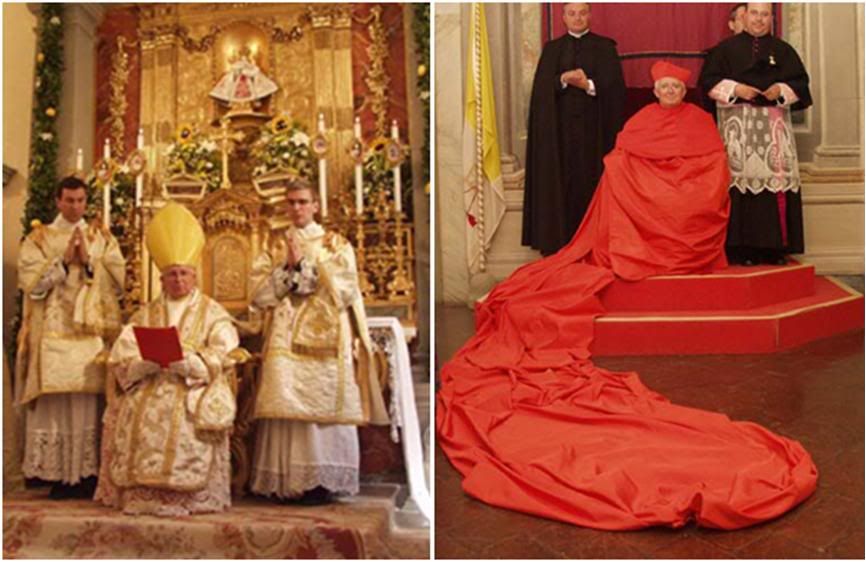 I picked 2 more photos from
I picked 2 more photos from DAILY PEEPS.
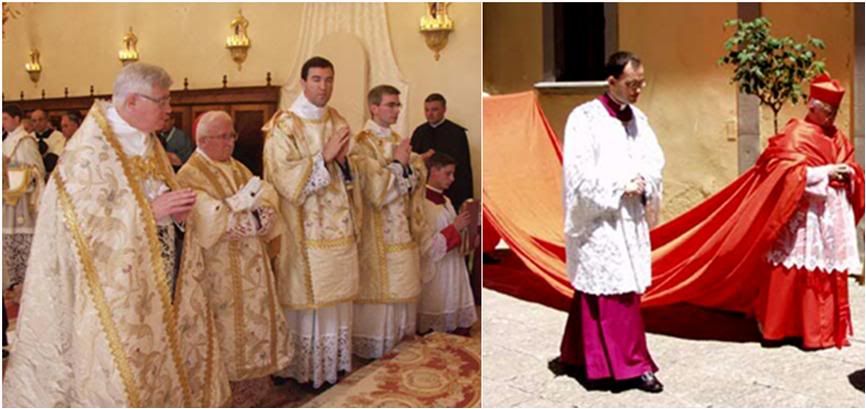
[Modificato da TERESA BENEDETTA 09/12/2008 21:59] |
 10/12/2008 00:59 10/12/2008 00:59 |
|
| | | OFFLINE | Post: 3.469 | Registrato il: 23/11/2005
| Utente Master | |
|
Pope names Spaniard to succeed Cardinal Arinze at worship congregation
By Cindy Wooden
Catholic News Service
VATICAN CITY (CNS) -- Pope Benedict XVI has accepted the resignation of Nigerian Cardinal Francis Arinze as prefect of the Congregation for Divine Worship and the Sacraments and has named Spanish Cardinal Antonio Canizares Llovera of Toledo to succeed him.
Announcing the changes Dec. 9, the Vatican said Cardinal Arinze was retiring after six years as head of the congregation and a total of 23 years at the Vatican; he celebrated his 76th birthday Nov. 1 and the 50th anniversary of his ordination to the priesthood Nov. 23.
Cardinal Canizares, 63, is a specialist in catechesis and has served as a member of the Congregation for the Doctrine of the Faith since 1995 when the office was headed by Cardinal Joseph Ratzinger, the future Pope Benedict. He also is a member of the Pontifical Commission "Ecclesia Dei," which oversees the pastoral care of Catholics attached to the use of the Tridentine-rite Mass.
Born in Utiel, Spain, Oct. 15, 1945, Cardinal Canizares was ordained in 1970 after studying at the seminary in Valencia and earning a doctorate in theology with an emphasis on catechesis from the Pontifical University of Salamanca. He taught at the university for many years and founded the Spanish Catechists Association.
Appointed bishop of Avila in March 1992, he drafted documents for the Spanish bishops' conference on subjects ranging from ecclesiology and the sacraments to sexual and medical ethics. He was named archbishop of Granada in December 1996 and was transferred to Toledo six years later. From 2005 until earlier this year, he served as vice president of the Spanish bishops' conference.
Pope Benedict named him a cardinal in 2006.
Cardinal Arinze was the last active Vatican official to have participated in the Second Vatican Council as a bishop; Pope Benedict attended, but as a theological expert.
In a 2002 interview with Catholic News Service marking the 40th anniversary of the council's opening, Cardinal Arinze said he attended the last session of the council as the coadjutor archbishop of Onitsha, Nigeria, and celebrated his 33rd birthday during the 1965 fall session.
"I was just a young priest made bishop two weeks before the last session of Vatican II," he told CNS. "One bishop asked me if I was a seminarian," he said.
Cardinal Arinze, who had been president of the Pontifical Council for Interreligious Dialogue for 17 years, took over the reins at the Congregation for Divine Worship and the Sacraments in 2002, just a few months after Pope John Paul II promulgated the third Latin edition of the Roman Missal, the text of prayers used at Mass. It fell to Cardinal Arinze to oversee the ongoing efforts of national bishops' conferences to translate the Latin texts into their local languages.
Presenting a 2004 document addressing abuses found in the liturgy, Cardinal Arinze told reporters, "No one should be surprised that over the course of time the holy church, our mother, has developed words, actions and, therefore, directives regarding this supreme act of worship. The eucharistic norms were elaborated to express and safeguard the eucharistic mystery and, even more, to demonstrate that it is the church which celebrates this august sacrifice and sacrament."
|
 11/12/2008 05:50 11/12/2008 05:50 |
|
| | | OFFLINE | | Post: 15.936 | Registrato il: 28/08/2005
| Utente Gold | |
|
A beautiful Basque woman
is the latest 'enfant prodige'
of orchestra conducting

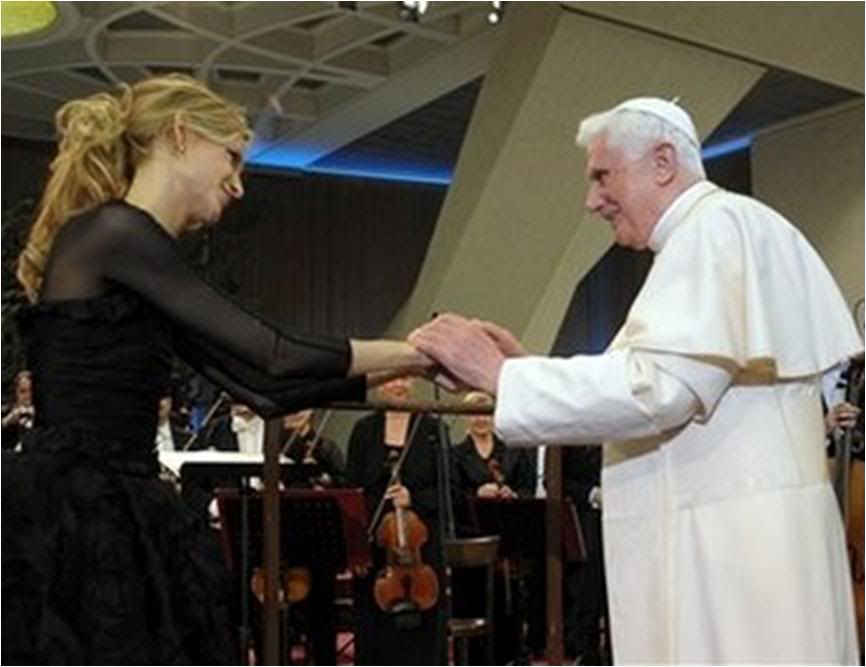
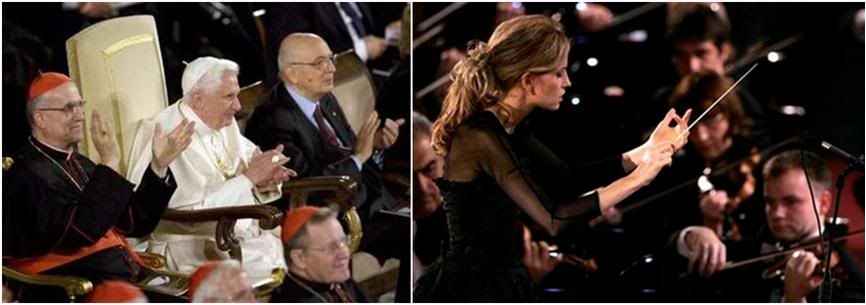
VATICAN CITY, Dec. 10 (Translated from Apcom) - A 36-year-old lady conducted a classical concert at the Vatican today in the presence of Pope Benedict XVI and the President of Italy, Giorgio Napolitano, for the 60th anniversary of the Universal Declaration of Human Rights.
A Spaniard with the unusual name, Inma Shara - because she is Basque - was thanked by the Pope at the end of this afternoon's concert for the 'talent and effectiveness' with which she led the Brandenburg State Orchestra of Frankfurt-an-der-Oder in performing pieces by Mendelssohn, Mozart, Ponchielli and De Falla.
At the end of the program, she knelt in front of the Pope to kiss his ring.
Among the most brilliant conductors of her generation, Shara has worked in the past with major conductors like Zubin Mehta and has conducted some of the best orchestras in the world, including the
national symphony orchestras of Russia, Israel and the Czech Republic, the London Philharmonic, and the Orchestra of Parma's venerated Teatro Regio.
Dubbed the 'girl prodigy of the classical world' by the Spanish newspaper El Mundo Shara has also been at the forefront of some humanitarian causes, such as the refugee children of Zambia.
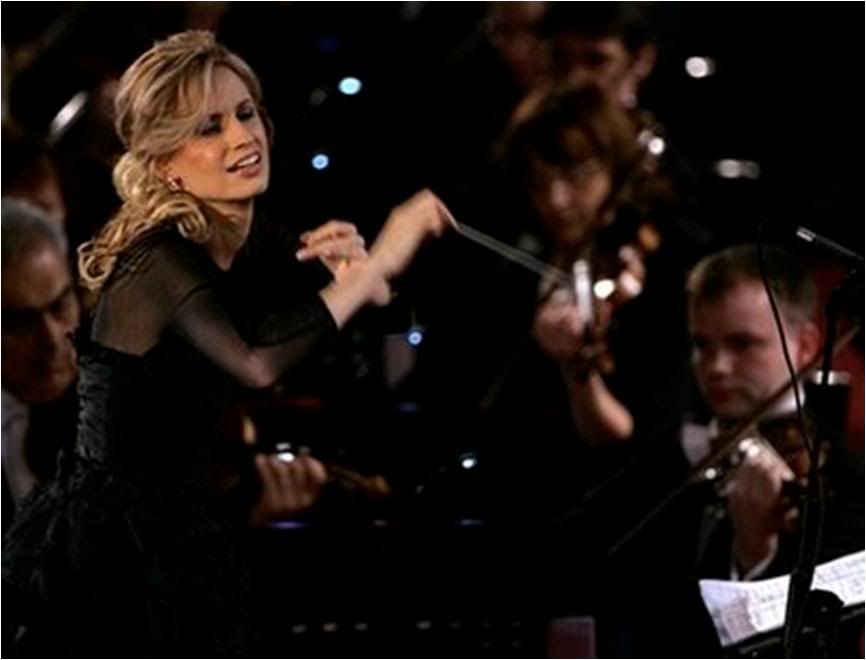
[Modificato da TERESA BENEDETTA 11/12/2008 05:59] |
 11/12/2008 06:11 11/12/2008 06:11 |
|
| | | OFFLINE | Post: 3.473 | Registrato il: 23/11/2005
| Utente Master | |
|
 Darn.
Darn.
[Modificato da benefan 11/12/2008 06:13] |
 12/12/2008 16:49 12/12/2008 16:49 |
|
| | | OFFLINE | | Post: 15.949 | Registrato il: 28/08/2005
| Utente Gold | |
|
CARDINAL AVERY DULLES, R.I.P.
Just read in Father Z that Cardinal Avery Dulles has passed away.
Let us pray.
From Rocco Palmo:
At 9.30, a statement from the Jesuits' New York province formally announced Dulles' passing; the cardinal died at 6.30 this morning in his room at the Jesuit infirmary at Fordham University.
Funeral arrangments are to be announced shortly, and later today will see the release of the customary telegram of condolence from the Pope, whose respect for Dulles was especially significant.
* * * * * * * * * * * * * * * * * * * * * * * * * * * * * * * * * * * * * * * * * * * * * * * * * * * * * * * * * * * * *
Later today, the Holy Father sent this telegram to Cardinal Edward Egan, Archbishop of New York:
HAVING LEARNED WITH SADNESS OF THE DEATH OF CARDINAL AVERY DULLES, I OFFER YOU MY HEARTFELT CONDOLENCES, WHICH I ASK YOU KINDLY TO CONVEY TO HIS FAMILY, HIS CONFRERES IN THE SOCIETY OF JESUS AND THE ACADEMIC COMMUNITY OF FORDHAM UNIVERSITY.
I JOIN YOU IN COMMENDING THE LATE CARDINAL’S NOBLE SOUL TO GOD, THE FATHER OF MERCIES, WITH IMMENSE GRATITUDE FOR THE DEEP LEARNING, SERENE JUDGMENT AND UNFAILING LOVE OF THE LORD AND HIS CHURCH WHICH MARKED HIS ENTIRE PRIESTLY MINISTRY AND HIS LONG YEARS OF TEACHING AND THEOLOGICAL RESEARCH.
AT THE SAME TIME I PRAY THAT HIS CONVINCING PERSONAL TESTIMONY TO THE HARMONY OF FAITH AND REASON WILL CONTINUE TO BEAR FRUIT FOR THE CONVERSION OF MINDS AND HEARTS AND THE PROGRESS OF THE GOSPEL FOR MANY YEARS TO COME.
TO ALL WHO MOURN HIM IN THE HOPE OF THE RESURRECTION I CORDIALLY IMPART MY APOSTOLIC BLESSING AS A PLEDGE OF CONSOLATION AND PEACE IN OUR LORD JESUS CHRIST.
BENEDICTUS PP. XVI
Cardinal Dulles gets a visit from Pope Benedict XVI on April 19, 2008, at the seminary in Dunwoodie, New York.
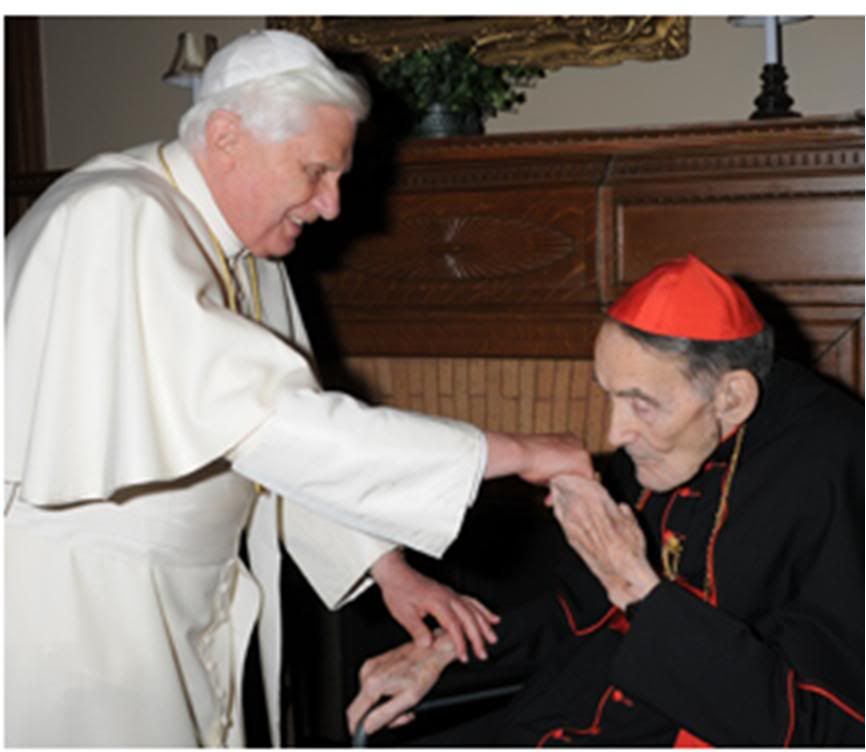 The story then
The story then:
Pontiff and Cardinal Dulles at Dunwoodie
Pope Benedict XVI met privately with Avery Cardinal Dulles, S.J., Laurence J. McGinley Professor of Religion and Society at Fordham University, at St. Joseph's Seminary (Dunwoodie), in Yonkers, N.Y., on Saturday afternoon, April 19.
The meeting took place in the suite of Edward Cardinal Egan, the archbishop of New York, after the Pope had greeted a group of disabled Catholic youths.
The Pope “bounded into the room with a big smile on his face,” according to Anne-Marie Kirmse, O.P., Cardinal Dulles' assistant, who was present for the meeting.
“He went directly to where Cardinal Dulles was sitting, saying, ‘Eminenza, Eminenza, I recall the work you did for the International Theological Committee in the 1990s,’ and Cardinal Dulles kissed the papal ring and smiled back at the Pope,” Sister Kirmse said.
The Pope also greeted Thomas R. Marciniak, S.J., of the Fordham Jesuit community, who served as Cardinal Dulles' priest chaplain for the meeting, the Cardinal’s medical attendants, and Sister Kirmse, she said.
The Pontiff then sat next to Cardinal Dulles to hear his prepared remarks, read by Father Marciniak. Cardinal Dulles has been in poor health recently and was unable to speak for himself.
Father Marciniak presented the Pope with a copy of Cardinal Dulles’s recent book, Church and Society: The Laurence J. McGinley Lectures, 1988-2007 (Fordham University Press, 2008).
The Pope expressed great interest in the book, Sister Kirmse said, and even interrupted the reading of the Cardinal’s remarks to ask again when the book had been published. The Pontiff eagerly looked through the book, and said he was touched by Cardinal Dulles's inscription to him.
Before leaving, the Pope blessed Cardinal Dulles, assured him he was in the Pope’s prayers, and encouraged the Cardinal in his illness.
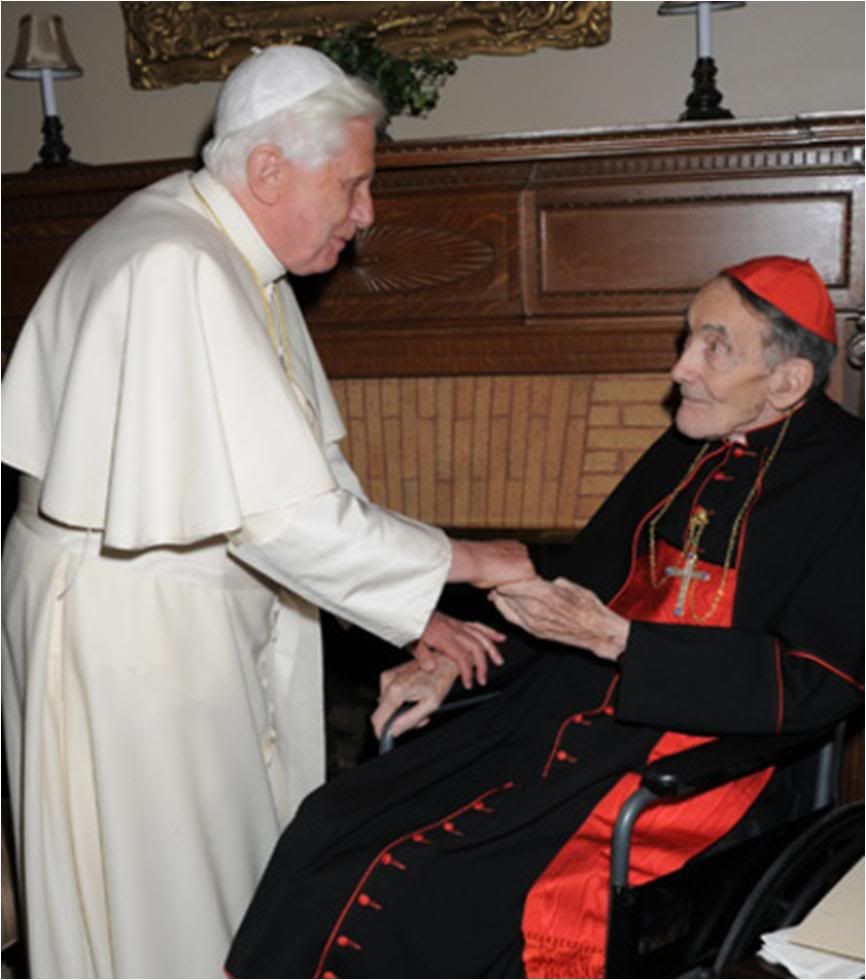 The day he turned 90
Jesuit priest Joseph Koczera who serves in the Bronx had this post on Augsut 24, 2008. when the cardinal celebrated his 90th birthday
The day he turned 90
Jesuit priest Joseph Koczera who serves in the Bronx had this post on Augsut 24, 2008. when the cardinal celebrated his 90th birthday:
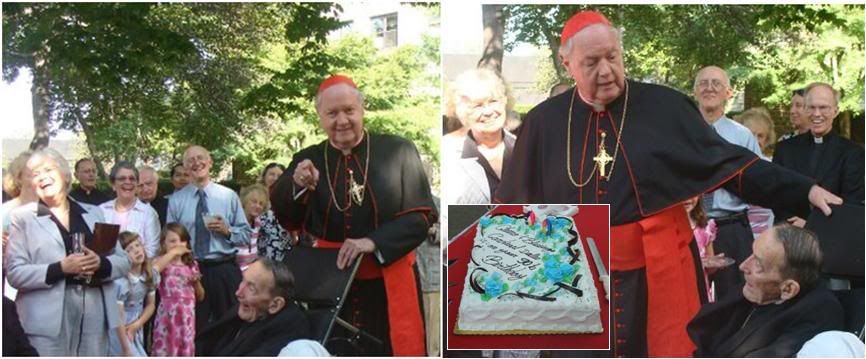
Fordham's own Avery Cardinal Dulles celebrated his ninetieth birthday today in the company of family, friends and brother Jesuits. As I mentioned in a previous post, I had the good fortune of taking part in the final seminar that Cardinal Dulles offered as Fordham's McGinley Professor of Religion and Society.
Wanting to pay my respects to a great theologian and a fine teacher, I made a point of attending the Mass of Thanksgiving offered today in celebration of the Cardinal's nine decades of life.
At an outdoor reception following the Mass, New York Archbishop Edward Cardinal Egan offered tribute to Dulles and led the assembled company in a birthday toast...
Though worsening paralysis has robbed Cardinal Dulles of the ability to speak, in written remarks read on his behalf at the conclusion of the Mass he expressed his gratitude for God's many gifts to him and mentioned how his growing infirmity has brought him closer to God.
In the absence of any published obituaries so far, here is what George Wiegel wrote about Cardinal Dulles earlier this year:
The nobility of Cardinal Dulles
By George Weigel

June 4, 2008
If the United States had a nobility, Avery Dulles would have been born into it. His great-grandfather, John W. Foster, and his great-uncle, Robert Lansing, both served as Secretary of State. So did his father, John Foster Dulles, who also negotiated the post-World War II peace treaty with Japan.
Avery Dulles’s uncle, Allen Dulles, was a legendary World War II spymaster and the first director of the Central Intelligence Agency.
Aunt Eleanor, whom many thought more formidable than her brothers, Foster and Allen, negotiated the Austrian State Treaty that pried the Red Army out of Vienna in 1955.
How did all this staunch Presbyterian stock produce a Catholic convert, a Jesuit priest, and the first American theologian to be raised to the cardinalate?
The answer is encoded in the motto on Cardinal Avery Dulles’s coat-of-arms, Scio cui credidi [I know in Whom I have believed]: St. Paul’s simple-yet-profound explanation to Timothy of why he was not concerned about his sufferings or his future.
That faith came to Avery Dulles in stages. He left prep school an agnostic, but a chance encounter with a blossoming tree on a soggy day during his undergraduate years at Harvard inspired the conviction that the world was governed by “an all-good and omnipotent God,” as he later put it. How might that conviction be embodied institutionally, though?
Slowly, Avery Dulles came to appreciate the subtlety, depth, and coherent structure of Catholic doctrine. Here was the truth, nobly expressed: the only possible response was to adhere to it, heart, mind, and soul.
That is what Avery Dulles has done for 68 years, since he entered the Catholic Church in 1940. That adherence to the truth of Catholic faith has been the organizing principle of his extensive theological work—more than 20 books, and over 700 articles.
Avery Dulles has been a theologian of the tradition, explicating ancient truths, stretching them a bit, exploring their implications, but never seeking cheap originality or sound-bite fame.
That modesty of purpose has gone hand-in-hand with an evangelical modesty of person. One does not often see cardinals of the Holy Roman Church repairing their shoes with duct tape, or walking across campus in cheap blue windbreakers; the cardinal’s sartorial style would cause pain at Men’s Wearhouse (not to mention Brooks Brothers).
There is no affectation here, though; Avery Dulles took a vow of poverty when he entered the Society of Jesus and he has kept it, as he has kept his vows of chastity, obedience to superiors, and that special obedience to the Pope which is the distinguishing hallmark of classic Ignatian life.
His nomination as a cardinal came as a complete surprise to him, if not to others. The night it was announced, my wife and I were entertaining friends who were also close to Father Dulles.
As dinner began, the phone rang: it was the newly-nominated cardinal, who brushed aside my congratulations and asked whether it was possible for him to be dispensed from the canonical requirement of becoming a bishop.
I assured him that the dispensation would be readily given, as it had been for other elderly theologians whom John Paul II honored with the red hat; there was a sigh of relief at the other end of the phone. The whole exchange was yet another expression of Avery’s modesty.
Still, cardinals employ the miter and crosier when they preside liturgically. So on the night of Feb. 23, 2001, Cardinal Avery Dulles processed into the Church of the Holy Names of Jesus and Mary to take possession of his Roman “title,” vested as none of us had ever seen him before.
At which point Jody Bottum, now editor of First Things, leaned over and whispered, “Now we know what Abraham Lincoln would have looked like in full pontificals.”
Suffering today from the ravages of post-polio syndrome, the cardinal’s humble, even grateful submission to the will of God is a model for us all. Avery Dulles, a noble soul, knows in Whom he has believed. That has made all the difference.
From the Fordham University website:


Avery Cardinal Dulles, S.J., (was) the Laurence J. McGinley Professor of Religion and Society at Fordham University, a position he has held since 1988. (He formally retired on April 1, 2008).
An internationally known author and lecturer, he was born in Auburn, New York, on August 24, 1918, the son of John Foster Dulles and Janet Pomeroy Avery Dulles. He received his primary school education in New York City, and attended secondary schools in Switzerland and New England.
After graduating from Harvard College in 1940, he spent a year and a half in Harvard Law School before serving in the United States Navy, emerging with the rank of lieutenant.
Upon his discharge from the Navy in 1946, Avery Dulles entered the Jesuit Order, and was ordained to the priesthood in 1956. After a year in Germany, he studied at the Gregorian University in Rome, and was awarded the doctorate in Sacred Theology in 1960.
He was created a Cardinal of the Catholic Church in Rome on February 21, 2001 by Pope John Paul II, the first American-born theologian who is not a bishop to receive this honor.
Cardinal Dulles served on the faculty of Woodstock College from 1960 to 1974 and that of The Catholic University of America from 1974 to 1988. He has been a visiting professor at: The Gregorian University (Rome), Weston School of Theology, Union Theological Seminary (New York, N.Y.), Princeton Theological Seminary, Episcopal Seminary (Alexandria, Va.), Lutheran Theological Seminary (Gettysburg, Pa.), Boston College, Campion Hall (Oxford University), the University of Notre Dame, the Catholic University at Leuven, Yale University, and St. Joseph's Seminary, Dunwoodie.
The author of over 750 articles on theological topics, Cardinal Dulles has published twenty-three books including
- Models of the Church (1974)
- Models of Revelation (1983)
- The Catholicity of the Church (1985)
- The Craft of Theology: From Symbol to System (1992)
- The Assurance of Things Hoped For: A Theology of Christian Faith (1994)
- The Splendor of Faith: The Theological Vision of Pope John Paul II (1999);
revised in 2003 for the twenty-fifth anniversary of the papal election)
- The New World of Faith (2000)
- Newman (2002)
- The History of Apologetics(revised edition, 2005)
- Magisterium: Teacher and Guardian of the Faith (2007)
The fiftieth anniversary edition of his book, A Testimonial to Grace, the account of his conversion to Catholicism, was republished in 1996 by the original publishers, Sheed and Ward, with an afterword containing his reflections on the fifty years since he became a Catholic.
Past President of both the Catholic Theological Society of America and the American Theological Society and Professor Emeritus at The Catholic University of America, Cardinal Dulles has served on the International Theological Commission and as a member of the United States Lutheran/Roman Catholic Dialogue.
He was a consultant to the Committee on Doctrine of the National Conference of Catholic Bishops. He has an impressive collection of awards, including Phi Beta Kappa, the Croix de Guerre, the Cardinal Spellman Award for distinguished achievement in theology, the Boston College Presidential Bicentennial Award, the Christus Magister Medal from the University of Portland (Oregon), the Religious Education Forum Award from the National Catholic Educational Association, America Magazine's Campion Award, the F. Sadlier Dinger Award for contributions to the catechetical ministry of the Church, the Cardinal Gibbons Award from The Catholic University of America, the John Carroll Society Medal, the Jerome Award from the Catholic Library Association of America, Fordham’s Founders Award, Gaudium Award from the Breukelein Institute, the Newman Award from Loyola College in Baltimore, the Marianist Award from the University of Dayton, the Saint Thomas Aquinas Medallion from Thomas Aquinas College in California, St. Joseph’s Seminary Dunwoodie Annual Dinner Award, the President’s Medal from Canisius College in Buffalo, the Loyola medal from Seattle University, and thirty-eight honorary doctorates.
[Modificato da TERESA BENEDETTA 13/12/2008 13:46] |
 13/12/2008 03:11 13/12/2008 03:11 |
|
| | | OFFLINE | Post: 3.477 | Registrato il: 23/11/2005
| Utente Master | |
|
Luxembourg's Monarch Steps Back On Euthanasia Bill
By JEFF ISRAELY
TIME Magazine
Friday, Dec. 12, 2008
The 20th century was not good to Europe's once mighty kings and queens. Old World royals lost most of their monarchical mojo, with their powers now limited to the purely ceremonial, as in Sweden, or to such roles as the Spanish King's command of his country's armed forces. The last absolute monarch left on European soil is Pope Benedict XVI.
Like most of his 20th century predecessors, Duke Henri of Luxembourg has played a mostly figurehead role in his country, a sliver of a nation wedged between Germany, Belgium, and France. But an unfolding royal family drama — replete with a papal cameo — has forced the handsome 53-year-old Duke to fall on what remains of his political sword. (Read TIME's Top 10 news stories of 2008.)
Duke Henri refused to sign a bill to legalize euthanasia for the terminally ill. The proposal, which would make Luxembourg one of the few countries to give terminal patients the right to die, was approved earlier this year by Parliament. But the monarch, a devout Catholic, says "reasons of conscience" prevented him from making it law. (Read about the fight to legalize euthanasia in the U.S..)
The Duke's stance is a strong nod to the current Pope, who has made the struggle against the secularization and "de-Christianization" of Europe amongst the central tenants of his papacy. Unlike the Pope, though, the Luxembourg monarch must face the realities of democracy. Aware that it would be the first time since 1912 that a Duke or Duchess of Luxembourg has defied the will of the elected government, Henri called on Parliament to change the Constitution to strip him of the power to approve laws. On Thursday, the Luxembourg Parliament voted overwhelmingly to approve the measure, which will become law on a second reading in the coming days. In the future, the reigning Duke or Duchess will only sign decrees to officially publish or "promulgate" pre-approved laws.
Since the Duke's annuncement, throne-watchers in Luxembourg have wondered why their head of state would take such a rigid stand on principle. Some speculate that the religious hardline is driven by the Grand Duchess Maria Teresa, Henri's wife and the mother of his five children. The Cuban-born daughter of Spanish aristocrats, the Grand Duchess has made her staunchly traditional Catholicism evident, and is believed to be very influential in her husband's public decisions.
The last time a Luxembourg royal refused to sign a bill into law was the Grand Duchess Marie-Adelaide, who opposed a measure to limit religious instruction in primary schools. Seven years later, after questionable decisions during World War I, she was forced to abdicate the throne to her younger sister.
Henri wants to avoid popular dissent around his reign, which may help explain his decision to cede political authority in order to hold on to the Duke's role as symbol of national unity. Michel Pauly, a professor of transnational Luxembourg history at the University of Luxembourg, says stripping the Duke of any legislative authority is the "natural democratic evolution" of the country, and predicts that Luxembourg will eventually go down the path of the purely ceremonial monarchy in place in countries such as Sweden and Denmark.
More importantly, Pauly says, is Henri's ongoing trouble with "public relations," since taking over from his well-liked father in October 2000, including his attempt to sell the family's forests to the state for a massive profit. "Henri doesn't have full popular legitimacy," says Pauly. "He has to find a new way to legitimate his role." Achieving such broad consent may not be helped by a hard line on bioethics in a country where fewer than 10 percent still attend church regularly. Getting out of the way, however, may just do the trick.
|
 14/12/2008 00:49 14/12/2008 00:49 |
|
| | | OFFLINE | | Post: 15.963 | Registrato il: 28/08/2005
| Utente Gold | |
|
MORE TRIBUTES TO CARDINAL DULLES
Perhaps an indication of Benedict XVI's great personal esteem for his fellow
theologian, the late Cardinal Avery Dulles, is L'Osservatore Romano's reporting
on his death in the 12/14/08 issue.
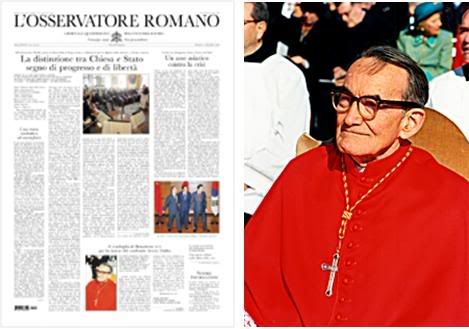 Besides the front page item with the text of the Holy Father's telegram of condolence to the Archbishop of New York, the inside pages feature a biography of the brilliant theologian who became a cardinal without ever being a bishop, as well as an article about him commissioned from Fr. Robert Imbelli, the New York priest who has been contributing lately to the OR.
Besides the front page item with the text of the Holy Father's telegram of condolence to the Archbishop of New York, the inside pages feature a biography of the brilliant theologian who became a cardinal without ever being a bishop, as well as an article about him commissioned from Fr. Robert Imbelli, the New York priest who has been contributing lately to the OR.
In highlighting the thrust of Cardinal Dulles's theology, Imbelli shows us - wittingly or not - why Benedict XVI found the American theologian a congenial (in the etymological sense) colleague. Imbelli's article was illustrated by another photograph from the Pope's meeting with Cardinal Dulles at Dunwoodie last April:
The theologian who was
creative in his faithfulness
to orthodox Catholic doctrine
by Fr. Robert Imbelli
Translated from
the 12/14/08 issue of

The Jesuit Cardinal Avery Dulles, who died Friday at 90, was the most distinguished theologian that the Church in the United States ever had and the first American theologian to be named a cardinal by the Catholic Church.
Together with the Dominican Yves Congar [who, like Dulles, was also made a cardinal at a late age], he was one of the most influential ecclesiologues of the 20th century.
Without a doubt, his most famous work was Models of Church (1974). Following the Second Vatican Council, he explored the inexhaustible riches of the mystery of the Church, explaining different models or modalities: the Church as sacrament, as community, as herald, as servant.
The book is acute from the theological point of view and approaches the pastoral in showing that the different viewpoints on the Church can be complementary and reciprocally enriching.
Unlike other theologians of the 1970s and 1980s, Dulles never neglected the fact that the mystery of the Church always points back to the greater mystery: Jesus Christ himself, who alone is the light of the world - Lumen gentium.
In the book The Craft of Theology (1992), he wrote one of the most beautiful expressions of this constant conviction: "Like a great sacrament, the Church extends in space and time the physical body of the Lord. It is not a mere indication of an absent Christ, but the symbolic manifestation of Christ who is present. The members of the Church, remade in the image of Christ by the power of the Holy Spirit, represent Christ to each other and to the world. He identifies himself with them. This is so, especially for the saints, who allow themselves to be totally transformed in Christ. The Church, in its fundamental reality, is a holy being that arises from the communication of himself by the One and Triune God."
In many ways, the Ignatian tradition permeated the life of and work of Avery Dulles. At a time when some theologians seemed to underscore unilaterally the horizontal earthly dimension, Dulles insisted that we should never lose that radical sense of God's transcendence.
It is true that Christians are called on to act for justice in the world, but it is also true that they are called onto adore God who is always greater than anything. [This is for the liberation theologians and perhaps, even the new Superior-General of the Jesuits, who always seeems to emphasize the social responsibilities of priests to the apparent neglect of the spiritual.]
When the disputes in the Church threatened to polarize the theological debate and pastoral priorities, Dulles - like his spiritual father, Ignatius of Loyola - sought to keep in the foreground the Christ-centeredness of the (Ignatian) Spiritual Exercises: that the absolutely crucial questions - both for the disciple as well as for the theologian - centered on Christ:
"quid egi pro Christo? quid ago pro Christo? quid agam pro Christo?" Dulles insisted that the center of the Jesuit's vocation was 'personal love for Jesus' and 'a desire to be among his intimate companions'.
And when an excessively simplistic appeal to the 'signs of the times' was used to justify the most disparate actions, Dulles wisely drew from the Ignatian charism of spiritual discernment for profundity and orientation.
For Dulles, discernment was always profoundly ecclesial. Like Ignatius, the cardinal underscored the necessity of thinking with the Church - sentire cum Ecclesia. Authentic discernment, he said was always manifested in the womb of the Church and according to her tradition.
Dulles always sustained the Catholic principle of et-et (and-and). Gos is One and Triune. The Lord Jesus Christ is God and man. The Church is institutional and charismatic. There does not exist a Church that is invisible nor one that is not institutional.
Nonetheless, the institutional dimension of the Church is at the service of its charismatic dimension.
In a particularly effective passage from his book A Church to Believe In (1982), he wrote: "Since charisms, in the broad sense of the term, are simply the concretizations of a life of grace, a Church without charisms can only a Church without grace. A Church of this kind would be a false sign - it would be announcing the presence of something which is absent; it would be a pseudo-Sacrament, and because of this, not truly Church".
In the last 20 years of his life, Cardinal Dulles was professor of religion and society, holding the Lawrence McGinley chair, at Fordham University, the Jesuit atheneum in new York City. Among his tasks was a public lecture twice a year. A collection of these lectures was published recently under the title Church and Society (New York, Fordham University Press, 2008).
In one of the lectures, Dulles describes the commitment of a whole life to a theology that follows the rhythms of both ressourcement and aggiornamento of Vatican-II: "Theology should confront new questions posed to the Church in the course of events and circumstances in the life of the world. A permanent creativity is needed in order to implant the faith in new cultures and maintain the doctrine of the Church abreast of the development of secular knowledge. New questions require new responses, but the answers of theology should always come from the Church's legacy of faith."
The Catholic theologian must be faithful and creative, that is, he should sustain renewal within tradition.
Cardinal Dulles had the blessing of a long and productive life. Nonetheless, he suffered in his last months a progressive paralysis which prevented him from being able to talk, and finally, he could not even move his arms.
Despite that, his witness to the Lord Jesus and his faith in him, which he called 'the precious pearl', were evident and a source of inspiration to all those who took care of him and came to visit him, as Benedict XVI did during his trip to the Untied States like April.
In fact, shortly before the Pope's visit, the cardinal gave the last of the McGinley Lectures at Fordham. He could no longer speak, but he was there in his wheelchair, while the words he had written were read by someone else.
This was the conclusion of his farewell lecture: "Suffering and impediments are not the worst evils, but are normal ingredients of life, particularly in old age. They must be accepted as elements of a full human existence. Until the age of 90, I have been able to work productively. Since I have been afflicted with progressive paralysis and can no longer talk, I can identify myself with the numerous paralytics and mutes in the Gospel, grateful for the loving and expert care I receive and for the hope of eternal life in Christ. If the Lord has called me to a time of weakness, I know well that his strength can be made perfect in infirmity. Blessed be the name of the Lord."
This was the tribute from a fellow Jesuit in the magazine America:
Avery, friend and hero
by James Martin, S.J.

Dec. 12, 2008
Today the church lost a world-historical figure: His Eminence, Avery Cardinal Dulles, SJ. For many Jesuits, they have lost a great friend: Avery.
Let me tell you a few brief stories about my generous friend. Others knew him far better than I did; many Jesuits studied with him over the course of many semesters at Woodstock College; others worked with him for many years during his time at Fordham University. But for a few days I was traveling partner.
Towards the middle of 2001, I received a voicemail message from my Jesuit provincial, in Boston, which is a call you always return--immediately. The New England Jesuits were thinking about new ways of fundraising, and had hit upon the idea of a celebratory dinner, which was scheduled for later that year, for October.
Their first honoree, my provincial hoped, would be Avery, but he was wondering whether the cardinal would accept. Would I be willing to ask him? “Me?” I said. “Why me?” Well, he responded, you had interviewed him in America magazine.
This was true: around the time of his elevation to cardinal, I had interviewed Avery in a wide-ranging conversation that traced his journey from son of a famous father to simple Jesuit novice to internationally known theologian to new cardinal. But other than that interview and a few conversations at Jesuit functions, I didn’t know him well.
“Could you call him anyway?” asked the provincial. So the next day I asked called the cardinal’s office and asked tentatively, “Would you be willing to travel to Boston and receive an award?”
“Would I have to give a long talk?” he asked. Not as far as I know, I said.
”Well, then of course!” he said with a laugh. And then to sign off, a holdover from his days in the Navy: “Over and out!”
My provincial was delighted. A few days later, someone from the New England Province, now more convinced than ever that the two of us were fast friends, said, “Since you know him so well, would you mind accompanying him to Boston?”
So I asked Avery: Do you need some help traveling? “Excellent!” he said. “When should we leave?” I suggested that we leave the day before, to ensure that we arrived on time, and would have some rest the day of the dinner.
“Oh, that would be a waste of time!” he said, clearly appalled by my sloth. “We’ll leave early that afternoon!”
My province was horrified, worried that he would be late to the big dinner. “Tell him to come earlier,” they said. “You can tell a cardinal to come earlier,” I answered.
So, a few months later, I met him early one afternoon at the Jesuit community at Fordham. Together we drove at breakneck speed in his little car toward a nearby train station.
While we were waiting for the train, standing underneath the shelter, with me holding his bags, Avery admitted that he felt uncomfortable receiving awards.
“I haven’t really done anything to deserve it,” he said. Nonsense, I said. What about all the books, the articles, the lectures, the work on behalf of the church?
“I suppose,” he said. “But I still feel awkward.”
On the train ride to Boston, Avery read a copy of a new book by Cardinal Francis Arinze, carefully making notes in the margins. I had planned to read a magazine, but was abashed by his industry, so took out a book about Thomas Merton instead, just to keep up.
At one point, he reached into his briefcase and pulled out a sheaf of papers. “Would you take a look at this?” he said.
“What is it?” I asked.
“It’s a talk I’m giving on ecumenism in a few weeks.”
“Avery,” I said, “You’ve forgotten more about theology than I’ve ever learned. What could I possibly add?”
“Well," he said, "just tell me if it’s clear.” After I finished reading, we discussed some (very few) areas of possible clarification, and he nodded with interest, and made notes.
He worked during the entire train ride, which gave me some insight on how he was able to accomplish so much so quickly.
We arrived at the Jesuit community with barely enough time to dress. “Come by my room when you’re ready to go,” he said.
Around 5:00 PM I knocked gently on his door. When he opened the door he was resplendent in his cardinal’s black cassock with red piping, and wearing over his shoulders the grand ferraiolo, or scarlet cape. He couldn’t reach down to button all the buttons of his long cassock, so I knelt down in front of him to reach the bottom ones.
“How do I look?” he said with a sly smile.
“As my mother would say,” I told him, “you look very handsome.”
Avery looked very patrician no matter what he wore; that night, the tall Jesuit looked like Abe Lincoln at the Vatican.
At the dinner he was friendly to all; and gave, despite his protestations, a brief but powerful meditation on hope, just one month after the attacks of September 11, 2001.
“Why don’t we sleep in tomorrow so that you can rest?” I said at the close of the night.
He looked aghast at, once again, my laxness. “Oh no!” he said. “Let’s not waste time! What’s the earliest train we can make?”
The next morning the two of us caught the 8:00 AM train to New York. Back in the Jesuit dining room at Fordham, over lunch, a few Jesuits asked how things were in Boston; the country was still reeling from the Sept. 11 attacks.
“People in Boston were very upset that two of the planes that hit the World Trade Center came from Logan airport,” I explained, relating what I heard the night before.
Avery said, “Well, gee, how do you think I feel? One of them came from Dulles!”
That was one of the rare times he referred to that place, out of humility. Once, during his time in Washington, D.C., when Avery was being driven to the airport by a young Jesuit, he asked him, “Father, which airport are we going to? National or…?”
Avery said, “The other one!”
Avery Cardinal Dulles, S.J., was unfailingly generous to me during the few years I knew him. When one of my first books was published, he not only furnished the publisher with a “blurb,” he also sent me, unbidden, a typewritten letter with a brief list of helpful corrections. He was a teacher, he said apologetically, so couldn’t resisted making a few corrections. (For one thing, he saved me from confusing the Fruits of the Holy Spirit with the Gifts of the Holy Spirit.)
And when I wrote about a topic I was afraid would prove too controversial, it was Avery who patiently read through a 400-page manuscript. He didn’t have to read the whole thing, I explained, worried about placing demands on his time. If he wanted to, he could read only the part in question.
“Of course I want to read the whole thing,” he said. “How else will I understand it in its full context?”
A few weeks later, he wrote me a generous letter saying that all was in line with “faith and morals.” But later on, he also offered a few corrections. Was I really sure about the spelling of St. Thomas Aquinas’s mother’s name?
Avery, who I knew only for the last ten years of his life, was a model Jesuit. Devoted to Jesus, to the Church, to the Society of Jesus, as well as intelligent, hardworking, prayerful, humble, and, to use and underutilized word, kind.
In the time that I knew him, he helped me to understand better not only what it meant to be, in Jesuit parlance, a “man for others,” but, in more common parlance, a Christian. A friend and a hero.
Pray for all of us.
Boston's Cardinal O'malley pays tribute to his fellow cardinal:
The passing of Cardinal Dulles
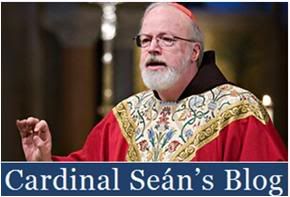
December 12, 2008
As I was putting the finishing touches on this week’s posting, I was saddened by the news of the death of my good friend Cardinal Avery Dulles.
Cardinal Dulles, a Jesuit, was the first American-born theologian and non-bishop to be elevated to the rank of cardinal. He died at the infirmary at Fordham University, where he taught for many years.
Cardinal Dulles was the son of President Eisenhower’s Secretary of State, John Foster Dulles, and the nephew of Eisenhower’s CIA director, Allen Welsh Dulles, and his conversion to Catholicism from such a prominent Presbyterian family was just one remarkable chapter in the story of his remarkable walk with the Lord.
My friendship with Cardinal Dulles goes back to the early 1970s, when he was teaching at Woodstock College, a Jesuit seminary. Later, we taught together at Catholic University.
Cardinal Dulles was one of the most brilliant and intelligent theologians in the history of the Church in the United States.
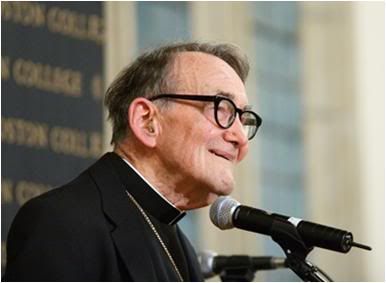
We were privileged to have him visit us last year when he gave a talk at St. John’s Seminary, which was one of his last public appearances. He suffered for many years from the aftermath of his battle with polio when he was a young adult. For the rest of life he walked with a cane.
In his final lecture at Fordham titled: “ A Life in Theology,” which was read for him, he said:
“Suffering and diminishment are not the greatest of evils, but are normal ingredients in life, especially in old age. They are to be accepted as elements of a full human existence,” he said. “As I become increasingly paralyzed and unable to speak, I can identify with the many paralytics and mute persons in the Gospels, grateful for the loving and skillful care I receive and for the hope of everlasting life in Christ. If the Lord now calls me to a period of weakness, I know well that his power can be made perfect in infirmity. Blessed be the name of the Lord!” [These are obviously the original English words of the same citation that Fr. Imbelli rendered to Italian and which I translated back to English in the first article on this post.]
He will be greatly missed.
Send-off for a Prince
by Rocco Palmo

Dec. 13, 2008
In three days of rites that'll serve to highlight both the theologian-dean's prominence in the academy and the universal prestige of a cardinal that was his in recent years, the New York Jesuits have announced the funeral arrangements for Cardinal Avery Dulles.
The public farewell begins on Tuesday the 16th at his beloved Fordham's main campus in the Bronx: a 2-5pm lying in-state in the university church, followed by a Mass of the Holy Name -- intended primarily for Jesuits, religious and seminarians -- at 7.30.
The schedule will repeat itself on Wednesday, with a votive liturgy of the Holy Eucharist for the university community, again at 7.30.
On Thursday, the 18th, the focus turns to St Patrick's Cathedral; Dulles will lie in state at the Midtown landmark from 10am until 1pm, the Mass of Christian Burial to begin an hour later.
The first and lone American cardinal to remain a simple priest, Dulles becomes the seventh member of the College to take his farewell from the 130 year-old temple... the others, however, all lived and died as Archbishop of New York.
The cardinal will be buried with his confreres in the Jesuit cemetery at Auriesville, near the Shrine of the North American Martyrs. But even so, Dulles will have the last word: his whirring mind and all-systems spirit undimmed amid the paralysis that marked his last months, a final book -- his 30th, its focus on the new evangelization -- is expected to be published in the new year.
[Modificato da TERESA BENEDETTA 14/12/2008 04:56] |
 14/12/2008 01:50 14/12/2008 01:50 |
|
| | | OFFLINE | | Post: 15.964 | Registrato il: 28/08/2005
| Utente Gold | |
|
Cardinal Avery Dulles, theologian
By ROBERT D. McFADDEN

December 12, 2008
Cardinal Avery Dulles, a scion of diplomats and Presbyterians, who converted to Roman Catholicism, rose to pre-eminence in Catholic theology and became the only American theologian ever appointed to the College of Cardinals, died today died Friday morning at Fordham University in the Bronx. He was 90.
His death, at the Jesuit infirmary at the university, was confirmed by the New York Province of the Society of Jesus in Manhattan.
Cardinal Dulles, a professor of religion at Fordham University for the last 20 years, was a prolific author and lecturer and an elder statesman of Catholic theology in America.
He was also the son of John Foster Dulles, the secretary of state under President Dwight D. Eisenhower, and the nephew of Allen Dulles, who guided European espionage during World War II and later directed the Central Intelligence Agency.
A conservative theologian in an era of liturgical reforms and rising secularism, Cardinal Dulles wrote 27 books and 800 articles, mostly on theology; advised the Vatican and America’s bishops, and staunchly defended the Pope and his Church against demands for change on abortion, artificial birth control, priestly celibacy, the ordination of women and other issues.
His task as a theologian, the Cardinal often said, was to honor diversity and dissent but ultimately to articulate the traditions of the church and to preserve Catholic unity.
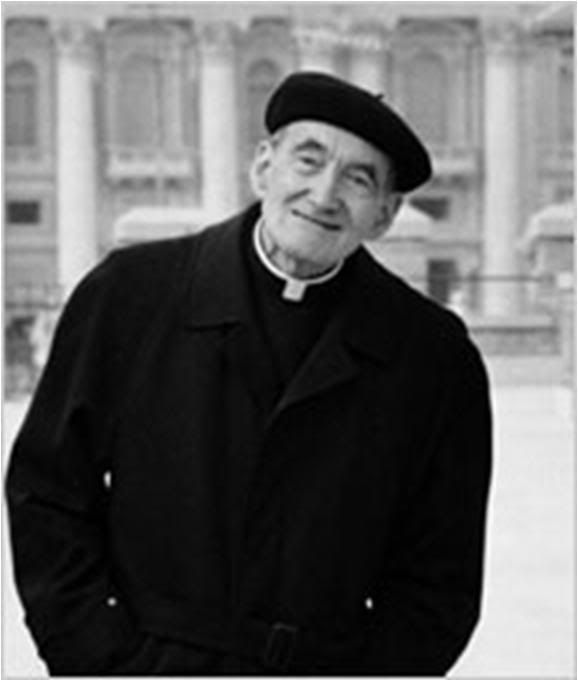 The cardinal in 2001.
The cardinal in 2001.
When Pope John Paul II designated dozens of new cardinals in early 2001, there were three from the United States. Archbishops Edward M. Egan of New York and Theodore E. McCarrick of Washington were unsurprising choices; it is common for heads of archdioceses to be given red hats.
But the selection of Father Dulles was extraordinary. Although his was an influential voice in American Catholicism, he was not even a bishop, let alone an archbishop.
The appointment was widely seen as a reward for his loyalty to the pope, but also an acknowledgment of his work in keeping lines of communication open between the Vatican and Catholic dissenters in America. Cardinal Dulles considered it an honorary appointment. He was 82, two years past the age of voting with other cardinals in electing a new Pope.
His investiture with 43 other scarlet-robed cardinals in Rome on Feb. 21, 2001, almost came unstuck. The last to step up to the Pope’s golden throne to receive his biretta, the red silk hat of office, Cardinal Dulles approached with his cane, knelt and was accoutered. But as he embraced the Pope, his biretta fell to the ground: a humbling at the great moment, he recalled wryly.
He carried the cane because of a recurrence of polio contracted while serving in the Navy in World War II. The polio had left him unable to walk for a time, but the symptoms had disappeared. They reappeared about a decade ago, affecting his leg muscles, and became progressively worse.
About a year ago, his arms and throat were affected, leaving him unable to speak. Thus, his farewell address at Fordham last April was delivered by the university’s former president, the Rev. Joseph O’Hare.
Cardinal Dulles was typically self-deprecating, and soft-spoken, a bit awkward: a lanky, 6-foot 2-inch beanpole with a high forehead, a shock of dark hair going gray and a gaunt face with sharp features. Abraham Lincoln without the beard came to mind.
His spiritual passage to Catholicism was like a fable. A young scholar with a searching mind, he stirred from his establishment Presbyterian family to face questions of faith and dogma. By the time he entered Harvard in 1936, he was an agnostic.
In his second book, A Testimonial to Grace, a 1946 account of his conversion, Cardinal Dulles said his doubts about God on entering Harvard were not diminished by his studies of medieval art, philosophy and theology.
But on a gray February day in 1939, strolling along the Charles River in Cambridge, he saw a tree in bud and experienced a profound moment.
“The thought came to me suddenly, with all the strength and novelty of a revelation, that these little buds in their innocence and meekness followed a rule, a law of which I as yet knew nothing,” he wrote. “That night, for the first time in years, I prayed.”
His conversion in 1940, the year he graduated from Harvard, shocked his family and friends, he said, but he called it the best and most important decision of his life.
He joined the Jesuits and went on to a career as a major Catholic thinker that spanned five decades.
His tenure coincided with broad shifts in theological ideas as well as sweeping changes brought on by the Second Vatican Council in the 1960s. These provided new understandings of how the Church, after centuries of isolation from modern thought and even hostility to it, should relate to other faiths and to religious liberty in an age when the Church was gaining millions of new followers in diverse cultures.
Cardinal Dulles devoted much of his scholarship to interpretations of the Vatican Council’s changes, which he said had been mistaken by some theologians as a license to push in democratic directions. The church, he counseled, should guard its sacred teachings against secularism and modernization.
“Christianity,” he said in a 1994 speech, “would dissolve itself if it allowed its revealed content, handed down in tradition, to be replaced by contemporary theories.”
Theological and academic colleagues, including many who disagreed with him, said Cardinal Dulles had set high standards of intellectual integrity, fairness in judgments and lucidity in lectures, essays and books. They said his was often a voice of mediation between the church and American Catholics who challenged church teachings.
In The Reshaping of Catholicism (Harper & Row, 1988), he wrote that the Vatican Council had acknowledged the possibility that the Church could fall into serious error and might require reform, that the laity had a right to an active role and that the Church needed to respect regional and local differences. But he also emphasized that “a measure of conservatism is inseparable from authentic Christianity.”
Avery Robert Dulles was born in Auburn, N.Y., on Aug. 24, 1918, the son of John Foster and Janet Pomeroy Avery Dulles. His family was steeped in public service.
Besides his father, who was secretary of state from 1953 to 1959, and uncle, who directed the C.I.A. from 1953 to 1961, his great-grandfather, John Watson Foster, was secretary of state under President Benjamin Harrison, and a great-uncle, Robert Lansing, held the post under President Woodrow Wilson.
Avery’s grandfather, Allen Macy Dulles, was a Presbyterian theologian and co-founder of the American Theological Society.
Avery Dulles attended primary schools in New York City and private secondary schools in Switzerland and New England, but had no strict Presbyterian upbringing.
He attended Harvard Law School for a year and a half before joining the Naval Reserve as a World War II intelligence officer. In 1946, he joined the Society of Jesus, began training for the priesthood and was ordained in 1956 by Cardinal Francis Spellman of New York.
He took a doctorate in theology at the Gregorian University in Rome in 1960, taught at Woodstock College in Maryland from 1960 to 1974 and at the Catholic University of America in Washington from 1974 to 1988, then joined the faculty at Fordham as the Laurence J. McGinley Professor of Religion and Society.
Cardinal Dulles served as president of the Catholic Theological Society of America in 1975-76 and of the American Theological Society in 1978-79. His books include Models of the Church, (Doubleday, 1974), a theological best-seller that appeared in many languages; A Church to Believe In: Discipleship and the Dynamics of Freedom, (Crossroad, 1982) on American Catholic theological concerns, and The Splendor of Faith: The Theological vision of Pope John Paul II, (Crossroads, 1999).
The cardinal is survived by eight nieces and nephews. His brother, John Watson Foster Dulles, an author and professor, died in San Antonio on June 23, and a sister, Lillias Pomeroy Dulles Hinshaw, died in 1987.
Cardinal Dulles remained an active voice in the church into the new century, responding when the church confronted sexual abuse scandals involving hundreds of priests in the United States.
After the United States Conference of Catholic Bishops adopted a national policy barring from ministerial duties any priest who had ever sexually abused a minor, Cardinal Dulles said the policy ignored priests’ rights of due process.
“In their effort to protect children, to restore public confidence in the church as an institution and to protect the church from liability suits, the bishops opted for an extreme response,” he said. He noted that the policy imposed a “one-size-fits-all” punishment, even if an offense was decades old and had not been repeated.
“Such action seems to reflect an attitude of vindictiveness to which the church should not yield.”
Remembering Cardinal Dulles
by Michael Paulson

December 12, 2008
Cardinal Avery Dulles, who grew up in a famous American family (Dulles Airport is named for his father), converted to Catholicism while at Harvard, and went on to become the most honored Catholic theologian in U.S. history, died today at age 90.
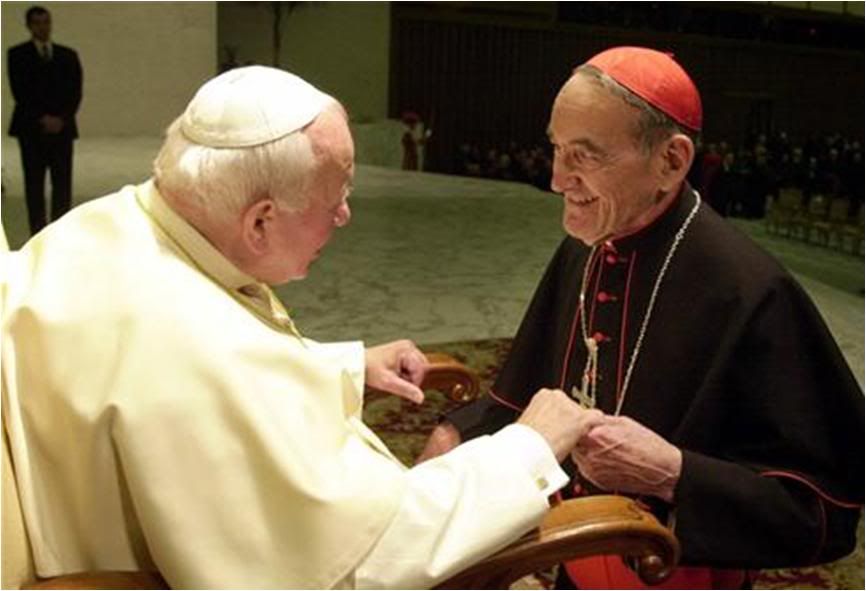 With John Paul II at the time of the 2001 Conclave.
With John Paul II at the time of the 2001 Conclave.
I had a chance to interview Cardinal Dulles back in 2001. Here's what I wrote at the time, including a partial transcript of our conversation:
Avery Dulles, the scion of a wealthy and prominent Presbyterian family, arrived at Harvard in 1936 as an agnostic, but found God in the buds of a tree by the banks of the Charles River one rainy February afternoon two years later.
"How could it be . . . that this delicate tree sprang up and developed and that all the enormous complexity of its cellular operations combined together to make it grow erectly and bring forth leaves and blossoms?" he asked himself. And the answer, he later wrote, was "Him who moved the stars, and made the lilacs bloom."
Dulles, a brilliant student passionate about learning, found himself ravenously consuming the new works of French Catholic theologians, and one day he marched into a Catholic bookstore and asked, "How do I get into your church?"
He had never even met a priest, but he decided to become one, figuring, "I guess I wanted to go the whole way."
Today, Dulles, whose great-grandfather, great-uncle, and father (John Foster Dulles) all served as US secretaries of state, and whose grandfather was a distinguished Presbyterian theologian, is now the most prominent Catholic theologian in America.
His accomplishments are many - 21 books, more than 650 articles, and a long career teaching thousands of students, for the last 13 years at Fordham University in New York, where he is still a professor at age 83.
And in February, he became the first American Jesuit and the first American theologian to be named a cardinal.
Last week, Dulles visited Boston to receive an award at a fund-raising dinner for the New England Jesuits. In an interview with the Globe at the Jesuits' humble provincial headquarters in the South End, Dulles talked about his journey to faith and his career since:
What drew you to Catholicism?
Perhaps it was the studies of the Reformation period. We had to read Luther and Calvin and the decrees of the Council and Trent and all those sorts of things, and I just found myself resonating with the Catholic positions in all those controversies, and also feeling that the culture of Europe was destroyed or ruptured by the Reformation in a way that was unfortunate.
And then I discovered the Catholic Church as it existed in Cambridge, Massachusetts, and it was a very vital, vibrant thing. St. Paul's parish there - the liturgy was very well performed, and Sunday evening they were having benediction, they were all singing the hymns of Thomas Aquinas in Latin, and I said, `This is the church for me.'
Your journey to Catholicism strikes me as having been more intellectual than spiritual.
I think that's probably true. I hope there was some spiritual aspect to it, but I've never had any great taste for what's called spirituality. I think it deals so much with emotions and feelings. I don't have many emotions or feelings. I tend to have ideas. I was interested in Catholicism ideally, intellectually. I was convinced that it was true. I was interested in truth.
How has your life changed since you've become a cardinal?
I get more invitations to lectures and things like that. I try to get out of them when I can, but I'm on the road a good bit. And then some things you have to get dressed up for.
What is the appropriate role of dissent in the church?
Dissent should be rare, respectful and reluctant. One's first reaction as a Catholic is to agree with the official teaching of the Church.
Can you imagine married priests, or female priests, in the church?
Married priests is a much easier question. We have married priests. In the early centuries many of the priests and bishops were married, and Eastern Rite Catholics have a married clergy, and we have a number of converts from Protestantism who are married priests who function as priests and enjoy their family life. So that's possible.
The question of women is a doctrinal issue. I think the weight of scripture and tradition is decisively against it. In the early '70s I was not sure the question had been decided, I was kind of open. But after 1976, Paul VI answered the question pretty thoroughly. That pretty much settled my mind on the point.
You have said one of the roles is to critique the culture. What is your critique of American culture?
Our technology is so advanced, we sometimes get the feeling that we can reconstruct everything, and we define power, so we have a hard time accepting anything that we cannot change.
So we want to reconstruct the church, we want to rewrite all the dogmas of the church. We feel that we can replace everything by our own power, and according to our own preference.
Our notion of freedom needs to be critiqued. We don't have a moral freedom to do what is wrong. We're under a higher law.
Then we want instant satisfaction. Part of the American culture is to produce as much as possible and consume as much as possible, so we consume an inordinate amount of the world's resources.
Our consumption should be governed by need, and needs to be restrained more than it is. We need to take greater care of the needs of the poor who are left out of the capitalist process.
Dear, dear Cardinal Dulles - who was not swayed by public opinion nor had - despite his superior intellect - any trace of smug or arrogant self-assertion over and beyond the deposit of faith! No wonder Cardinal Ratzinger/Benedict XVI valued you so much. May you and he have many more spiritual heirs in the new generations of American priests.
P.S. The death of Cardinal Dulles brings up again a question I asked before on the Forum. Does anyone know of any other theologian besides Joseph Ratzinger who was made a cardinal before he turned 50? I was very struck by the text of the citation read by Pope Paul VI when he was named Cardinal - it was entirely on the basis of his theological work!
Which is perhaps what led Hans Kueng to make the flagrantly false claim that Joseph Ratzinger chose to play the game of Church politics in order to rise in the hierarchy - ignoring the fact that the same Joseph Ratzinger joined him in Tuebingen [and Kueng keeps boasting how he recruited him] to teach after the Council, then moved on to Regensburg where he stayed for the next eight years as an academic, until his surprise nomination to be Archbishop of Munich-Freising.
Since it appears that he never met Pope Paul VI during the Council, who or what brought him to the Pope's attention during those academic years? I suppose his work as member of the International Theological Commission to which he was first named, I think, when he was teaching in Regensburg, and no doubt, his writings, particularly Introduction to Christianity.
And again, I like to think that perhaps Paul VI saw in him the rare orthodox theologian - the sentire-cum-ecclesia kind - who was the polar opposite of media-darling dissenters like Kueng and company, and who could help defend the Church from the liberal onslaught that followed Vatican-II.
After all, this was already 1977, and Paul VI had ample chance to survey the disaster being wrought on the Church by the Vatican II 'spiritists' [and had perhaps realized the supreme error of his drastic and unprecedented liturgical reform, as his cerimoniere, Cardinal Noe, appeared to indicate in an interview earlier this year with PETRUS.]
The Very Model Of Lucidity:
An appreciation of
Avery Cardinal Dulles, 1918-2008
By George Weigel

Posted: Saturday, December 13, 2008
There is nothing like Debrett's Peerage in these United States. If there were, Avery Cardinal Dulles, S.J., who died on the feast of Our Lady of Guadalupe, Dec. 12, would surely have been in it.
His great-grandfather, John W. Foster, was President Benjamin Harrison's secretary of state--a service done for President Wilson by his great-uncle, Robert Lansing, and for President Eisenhower by his father, John Foster Dulles.
His uncle, Allen Dulles, was America's European spymaster during World War II, and his aunt Eleanor (whom many thought the most formidable of the clan) was largely responsible for negotiating the Austrian State Treaty and getting the Red Army out of Vienna in 1955.
John Foster Dulles was also the most prominent Protestant layman of the 1940s, serving as chairman of the Federal Council of Churches' Commission to Study the basis of a "just and durable" peace in the days when that predecessor to the National Council of Churches stood at the apex of the American establishment, alongside the American Medical Association and the American Bar Association.
Foster Dulles's robust Calvinism didn't take with young Avery, who would say in later years that he left Choate for Harvard a thoroughgoing skeptic and agnostic. But neither did his agnosticism last.
As he recounted in his memoir, A Testimonial to Grace, he was walking along the Charles River on a blustery, early spring day in 1938 when he noticed the veins in a leaf on a blossoming tree; such precision, beauty, and purpose could not, he thought, be an accident. The universe, he imagined, must be governed by "an all-good and omnipotent God." "That night," he wrote, "I prayed for the first time in years."
For the intellectually inquisitive Dulles, however, belief in God opened up another set of questions: such as, where might God's will and purposes be institutionally embodied?
Dulles's undergraduate years coincided with a renaissance of Roman Catholic intellectual and apologetic life at Harvard; and so it was that, slowly but certainly, this product of the strongest Presbyterian stock in America came to appreciate the depth, subtlety and coherent structure of Catholicism--as well as its capacity to inspire civilizational nobility, which he found manifest in the Middle Ages, a period of which he was very fond.
Thus, he entered the Roman Catholic Church in 1940--relishing, as he used to joke years later, the part of the ritual in which the candidate had to abjure and recant his former heresies. After decorated service in the Navy during World War II, Avery Dulles entered the Society of Jesus--then the intellectual elite corps of the Roman Catholic Church--and was ordained a priest in 1956.
His pre-ordination philosophy and theology courses and his graduate studies in Rome, where he received the doctorate in 1960, prepared him for a teaching career at Woodstock College, Catholic University and Fordham.
That immersion in the Catholic tradition in full also gave him the conceptual anchor that kept him remarkably steadfast in the intellectual whitewater of the post-Vatican II years.
His steadiness, which was complemented by an equally remarkable fairness to those with whom he disagreed, made him a unique figure on the U.S. Catholic theological scene--a reference point for just about every serious Catholic religious thinker, and more than a few Protestants and Jews as well.
His lecture style was not particularly scintillating; but his written work--extending over more than two dozen books and 800 scholarly articles--was the very model of lucidity. Pope John Paul II, on the advice of Cardinal Joseph Ratzinger, honored that accomplishment in 2001 with the cardinal's red hat.
Avery Dulles was a self-consciously ecclesial theologian, who made a deliberate decision to "think with the church." Some imagined this a form of conservatism; if it was (and such labels really don't work with theology), it was an evangelical conservatism, an intellectual approach inspired by Christ's instruction, after the multiplication of loaves ands fishes, to "pick up the fragments, that nothing may be lost."
Dulles explicated ancient truths; he stretched our understanding of them a bit; he probed their implications. But he never sought cheap originality or sound-bite fame.
That modesty of intellectual purpose went hand in hand with a charming modesty of person. One does not often see cardinals of the Holy Roman Church walking across campus in cheap blue windbreakers; the cardinal's sartorial style would have caused grimaces at Wal-Mart, let alone Brooks Brothers.
This was not an affectation, however, nor was it some kind of eccentric noblesse oblige. Avery Dulles took a vow of poverty when he entered the Society of Jesus and he kept it, as he kept his vows of chastity, obedience to superiors, and that special obedience to the pope that St. Ignatius Loyola intended to be the distinguishing hallmark of Jesuit life. Every dime of his royalties went to the Jesuits; as for patching the holes in one's shoes, well, duct tape would do just fine.
Although John Paul II had long been in the habit of naming elderly Catholic theologians to the cardinalate as an expression of the church's gratitude for their service, Avery Dulles's nomination as a cardinal came as a surprise to many--and posed something of a dilemma to him.
The night the announcement was made, my wife and I were entertaining friends who were also close to Father Dulles. As dinner began, the phone rang: it was the newly nominated cardinal, who brushed aside my congratulations and asked whether it was possible for him to be dispensed from the requirement in canon law that a cardinal be ordained a bishop; I assured him that a dispensation would be readily given, as it had been for others like him. There was an audible sigh of relief at the other end of the phone. It was all another expression of the man's humility.
Still, cardinals employ the miter and crozier when they preside liturgically. So on the night of Feb. 23, 2001, Cardinal Avery Dulles processed into the Church of the Holy Names of Jesus and Mary near Piazza del Popolo to take possession of his Roman "title," vested as none of us had ever seen him before.
The Discalced Augustinians present were thrilled that their small church had become the titular Roman parish of a new cardinal; others doubtless pondered the neat historical symmetry of Dulles becoming the titular pastor of a church in which one of his heroes, St. Robert Bellarmine, had once preached and taught.
But others couldn't help noticing a different kind of symmetry--in this case, American. Jody Bottum, now editor of First Things, put into words what more than a few of us were thinking: "Now we know what Abraham Lincoln would have looked like in full pontificals."
In his later years, as Cardinal Dulles suffered greatly from the ravages of post-polio syndrome, his humble, even grateful submission to the will of God became an inspiration to many. (He also kept working, even after his ravaged throat muscles wouldn't allow him to speak. One friend, on leaving after a visit, said, "Avery, is there anything I can do for you?" The cardinal scratched out on a note pad, "Put some more paper in the printer.")
The nobility here might seem aristocratic in character, given his background; yet I think it was, in fact, specifically Christian.
For his cardinal's coat of arms, Avery Dulles chose the Latin motto, Scio cui credidi ("I know in whom I have believed"): St. Paul's simple-yet-profound explanation to his disciple, Timothy, of why he was not concerned about his sufferings or his future.
Avery Cardinal Dulles knew in Whom he believed. That made him the man he was, and the theologian he was. That made all the difference in an original American life that spanned more than a third of American history.
[Modificato da TERESA BENEDETTA 17/12/2008 22:30] |
 14/12/2008 06:19 14/12/2008 06:19 |
|
| | | OFFLINE | Post: 3.479 | Registrato il: 23/11/2005
| Utente Master | |
|
As Cardinal Arinze Retires
Editorial
The Guardian (Nigeria)
Dec. 14, 2008
One of the leading lights in the Vatican, His Eminence, Cardinal Francis Arinze, has retired from active service at the age of 76. After an illustrious career at the Holy See spanning over fifty years, Cardinal Arinze has indicated his wish to retire to his village in Anambra State where he is revered as a mentor and folk hero.
Cardinal Arinze was born in Oraukwu, Anambra State, into a typical traditional Ibo family on November 1, 1932. He grew up doing family chores. But the moment the young Arinze set eyes on Roman Catholicism he knew that that was the life he wanted for himself. He came under the spell of Reverend Father Michael Tansi who baptised him on his ninth birthday. Father Tansi, a great pillar of Catholicism and selfless servant, was beatified by Pope John Paul II in 1998.
Cardinal Arinze converted to Catholicism before his parents did. His father who was initially opposed to his son becoming a priest later relented and gave his full support when he noticed how he was enjoying life under the cloisters. At the age of 15, Francis Arinze enrolled at All Hallows Seminary, Nnewi, Anambra State, where he graduated in 1950 with a degree Philosophy. In 1955 he proceeded to Rome to study Theology at the Pontifical Urban University where he ultimately earned a doctorate in Sacred Theology summa cum laude. From 1961 to 1962, Arinze was professor of liturgy, logic, and basic philosophy at Bigard Memorial Seminary. At the age of 32, Arinze became the youngest Roman Catholic bishop in the world to be ordained to the episcopate on August 29, 1965.
From then on the story of Cardinal Arinze was that of an unstoppable rising star in the Catholic congregation. He was at various times Coadjutor Bishop of Onitsha, Archbishop of Onitsha, and Pro-Prefect of the Pontifical Council for Interreligious Dialogue. In 1985 he was elevated to Cardinal and made President of the Pontifical Council for Interreligious Dialogue. He was 53 and one of the youngest persons ever appointed to the College of Cardinals. In 2005 he was installed Cardinal-Bishop of Velletri-Segni. He retired in December 2008 as the Prefect Emeritus of the Congregation for Divine Worship and the Discipline of the Sacraments.
It was not all song and dance for Cardinal Arinze. He witnessed the Biafran war and was himself a refugee. He saw the huge suffering inflicted on ordinary people by war and did his best to alleviate that suffering. Cardinal Arinze was at ease with other religions and established a working relationship with Muslims. He was a close confidant of Pope Paul II who recognised his skills at organisation and cohesion and who promoted him to be the Vatican's spokesman on inter-religious affairs.
When in 2005 the Papacy fell vacant, many had hoped that the white smoke of the conclave will herald the arrival of a black Pope. But the College of Cardinals chose Joseph Ratzinger who became Pope Benedict XVI. It is noteworthy that Pope Benedict invited Arinze to replace him as Cardinal-Bishop of Velletri-Segni.
Arinze should take pride in the fact that during his years in the Vatican he had helped to advance the cause of Catholicism worldwide. In the past 20 years, the number of African Catholics has nearly doubled, from 50 million to more than 90 million; an estimated 13 million of which are Nigerians. Today, the largest Christian denomination is no longer a European institution as two-thirds of the world's 1 billion Catholics live below the equator. Black Catholics are coming of age.
Cardinal Arinze is the author of more than a dozen publications including the much referenced Sacrifice in Ibo Religion, Building Bridges, The Church in Dialogue, Meeting other Believers and Religions for Peace. A notable speaker, he has travelled widely on his missionary journey to the Americas, the Philippines, Africa and Europe espousing Catholicism. He has produced over 1700 religious television programmes.
Cardinal Arinze is returning to Nigeria at a critical time in the affairs of this nation. We have been recognised globally as the most religious people on earth, yet paradoxically, we are also one of the most corrupt. We were not able to hold a successful election in 2007 for which the Cardinal prayed. There is a dangerous lack of moral authority in the polity and even the churches are not immune to it. Clearly Nigeria needs help.
The question that arises from this powerful record is what use Nigeria can make of the talents of this prodigious man of letters and spirituality. Ours is a country of short memories and we are notoriously deficient in utilising the services of persons who in various ways have distinguished themselves and lifted the profile of the nation. We hope that the Nigerian government will find some meaningful role for Cardinal Arinze even as he goes into well-earned retirement.
|
 18/12/2008 15:20 18/12/2008 15:20 |
|
| | | OFFLINE | | Post: 16.008 | Registrato il: 28/08/2005
| Utente Gold | |
|
Cardinal Canizares:
‘My duty in charity is
to communicate the Church’s teachings’

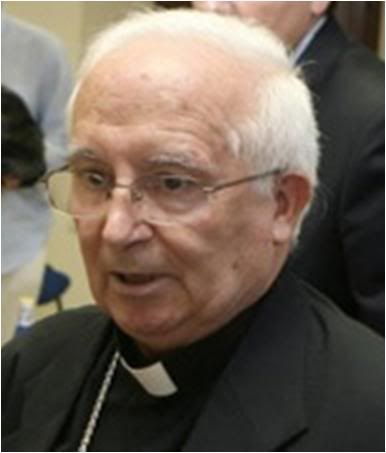
Madrid, Dec 16, 2008 (CNA).- In an interview with the Spanish daily La Razon, the new prefect of the Congregation for Divine Worship, Cardinal Antonio Canizares, said, “It is my duty in charity as a service to mankind and to society to communicate the Church’s teachings” in response to laws that are contrary to man and the Christian faith.
Cardinal Canizares, who will continue to serve for a brief period as Archbishop of Toledo also stated, “I am not speaking out against anything, much less against the government. I am among those who will always treat the government with respect and fidelity.”
But, he went on, “this does not mean that, as the Pope said in ‘Deus caritas est,’ that out of political charity, I can say that human rights are being respected when they really are not being respected.”
For this reason, he stated, “I will have to complain along with parents when the right to education is not fully respected. Or I will have to ask that the right to life be respected from conception to natural death.”
He continued, “People say I am the bishop who is the most against the Zapatero government. This is completely untrue. But, I insist, I do proclaim and defend what the Church says. I don’t impose it on anyone, I propose it, and I demand that when fundamental questions are at stake, citizens need to wake up.”
[Modificato da TERESA BENEDETTA 18/12/2008 18:00] |
 19/12/2008 15:59 19/12/2008 15:59 |
|
| | | OFFLINE | | Post: 16.016 | Registrato il: 28/08/2005
| Utente Gold | |
|
Excommunication of Fr. Bourgeois
will ‘certainly take place,’
Vatican official says
 This story has been around in various forms for a few weeks now, but I am posting it here for the first time because this report gives the Vatican view as well.
This story has been around in various forms for a few weeks now, but I am posting it here for the first time because this report gives the Vatican view as well.
Vatican City, Dec 17, 2008 (CNA) - A Vatican official has said that the excommunication of Fr. Ray Bourgeois, an American Maryknoll priest who advocates the ordination of women, will "certainly take place" unless the priest renounces his stand.
In exclusive comments made to CNA, the official called Fr. Bourgeois’s November letter defending his stand a "sad piece of propaganda" and argued the dissenting cleric takes his inspiration from American newspapers rather than Catholic doctrine.
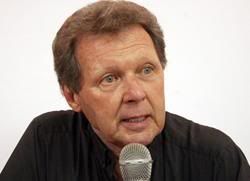
Fr. Bourgeois, who is involved in organizing human rights protests at the military training school formerly known as School of the Americas, has called the Catholic position on women’s ordination "sexist." In August, he delivered a homily at a ceremony at a Unitarian church purporting to ordain a woman to the Catholic priesthood.
In an October 21 letter, the Congregation for the Doctrine of the Faith gave Fr. Bourgeois 30 days to renounce his public support for the ordination of women, on penalty of excommunication.
In a November 7 letter, Fr. Bourgeois said he was compelled to take his stand as a matter of conscience and would not renounce it. The priest said he knew many women who feel called to the priesthood and argued that the Church cannot treat this reputed vocation as invalid.
He characterized the "exclusion of women from the priesthood" as an "injustice."
CNA spoke with an official of the Congregation for the Doctrine of the Faith regarding the case of Fr. Bourgeois. The official reiterated that all procedures at the CDF are confidential.
However, since Fr. Bourgeois decided to make public his letter to the Congregation, he said that "clearly the letter is a sad piece of propaganda and in no way expresses any doctrinal substance for his position."
"Rather, Fr. Bourgeois feels he can engage with the (CDF) to change the doctrine of the Church… quoting American newspapers as if they were a source of any kind of Catholic doctrine."
The official said that the formal excommunication will "certainly take place" as soon as the CDF "responds personally to the letters sent either supporting or denouncing (Fr. Bourgeois.)"
"Of course, Fr. Bourgeois could avoid excommunication at any point if he recants, but unfortunately all his latest actions do not seem to point in that direction," the official told CNA.
I flinch at the thought of the two American priests who have been very much in the news in the past few months. The other one is Michael Pfleger, the Chicago firebrand whose hate talk is as offensive - and as un-Christian- as Jeremiah Wright's.
Fr. Bourgeois has, of course, every right to say what he wants to say and advocate any cause, but as a Catholic priest, he knows what he cannot do.
He cannot openly preach and campaign for a cause that is in clear violation of Catholic teaching, without being penalized for it by the Church - which cannot make exceptions for anyone, no matter how self-righteous they may feel. In this, the Church is both being true to itself, and just in applying canon law.
Fr. Bourgeois not only is in conscious and deliberate opposition to Catholic teaching, but is also in flagrant disobedience to the Church. As an ordained priest, he took a vow of obedience. If he does not now intend to carry out that vow, then he knows he must take the consequences.
Catholic dissidents may be motivated by the most sincere conviction - 'primacy of individual conscience' is what they call it - but that does not justify their disobedience and disregard of Church teaching. Not to accept that religion is also a discipline is to be disingenuous, if not downright intellectually dishonest.
Obedience is not compelled by the Church as an instrument of power but as an exercise in humility. A priest who takes the vow of obedience cannot disregard it, and believe he is acting on the same plane as a Catholic lay dissident who has not taken a vow and is not ordained as a sacramental minister of the Church.
In both cases, however, disobedience to the Church - outright defiance of it - is sheer exercise of the ego. If you cannot abide what the Church teaches, then get out of it, or at least, keep your peace and don't expect the Church to bend to your will just because thousands, or even millions, of other dissident Catholics think like you do.
Regardless of what these monumentally presumptuous egoists/egotists think, 'they' are not the Church. Individuals or a group of them, wanting to act completely as they please, without regard for Church teaching and tradition, are completely delusional if they think that because they are nominal members of the Church, 'they' alone constitute the Church. They are plain and simple dissidents who want to impose their will on the Church.
They make a mockery of all those - including the saints - who take their faith 'wholesale', not a la carte.
[Modificato da TERESA BENEDETTA 19/12/2008 16:05] |
 19/12/2008 16:37 19/12/2008 16:37 |
|
| | | OFFLINE | | Post: 16.018 | Registrato il: 28/08/2005
| Utente Gold | |
|
Rick Warren's selection to give
invocation at Obama's inauguration
angers gay groups
Washington DC, Dec 18, 2008 (CNA) - Pro-life Evangelical Pastor Rick Warren will give the invocation at the President-elect Barack Obama’s inauguration, it was reported on Wednesday. Negative reactions from homosexual activists prompted the president-elect to defend his selection.
Some pro-life individuals have also criticized Rev. Warren’s cooperation with Obama, a staunch advocate of abortion rights.
Rev. Warren, the head of Saddleback Church in Lake Forest, California, hosted Obama at a presidential candidates’ forum at his church earlier this year. He also authored the best-selling book The Purpose Driven Life.
[Since 2002 it has sold more than 30 million copies worldwide, making it the bestselling nonfiction hardcover book in history - according to a Newsweek article about it in the forthcoming Dec. 22 issue, to be posted below.]
Some praised Obama’s decision as evidence of his willingness to reach out to those who disagree with him.
“It makes a whole lot of sense,” said David Brody of CBN News. “Even though Warren and Obama disagree on the life issue, they do see eye to eye on many social justice issues.
“This move is also classic Obama because it is a signal to religious conservatives that he’s willing to bring in both sides to the faith discussion in this country. Obama has never shied away from that.”
However, some homosexual groups were outraged over the selection of Rev. Warren because of his support for California’s Proposition 8, which overturned a court decision that imposed same-sex marriage on the state.
Joe Solmonese, President of the homosexual activist group Human Rights Campaign, wrote a letter to Obama calling the selection of Warren “a genuine blow to LGBT Americans.”
Characterizing the successful passage of Proposition 8 as “the greatest loss our community has faced in 40 years,” Solmonese claimed that inviting Warren has tarnished the view that “gay, lesbian, bisexual and transgender Americans have a place at your table.”
Characterizing homosexual activism as a “fight for basic equality and fairness,” Solmonese tried to link Warren with Focus on the Family head James Dobson and. He also said Warren played the role of “general” in “the cultural war against LGBT Americans.”
Arguing that Obama’s selection makes homosexuals feel a “deep level of disrespect,” Solmonese urged the president-elect to reconsider having Warren offer the invocation.
The reaction to the selection of Warren contrasts with homosexual activists’ positive reaction to the Presidential Inaugural Committee’s choice to allow a homosexual band to march in the Inaugural Parade.
On December 10, the committee announced that the Lesbian and Gay Band Association (LGBA) would march in the Inaugural Parade. In a press release, the committee noted it would be the first time an “openly LGBT group” would participate.
On Thursday, Obama defended Rev. Warren’s place at the Presidential Inauguration. He said that Americans need to “come together” and reasserted that dialogue was an aim of his campaign.
A “wide range of viewpoints” will be present at the inauguration, Obama said.
The president-elect noted that he had been invited to speak at Rev. Warren’s church despite their disagreements.
Obama also characterized himself as a “fierce advocate for equality” for gays and lesbians and said he will remain so.
Rev. Warren’s participation was also challenged by some pro-life individuals. CBN’s David Brody said he had received many letters that “absolutely rip” Warren.
“Let me just say that pro-lifers are NOT happy with Warren at all,” Brody said.
Offering his own opinion, Brody said:
“While I understand the justifiable concern coming from pro-lifers and liberals, the bottom line is this: why can’t a pro-life pastor pray for a pro-choice candidate? Are politics and past prejudices clouding our judgment here? Warren isn’t up there to speak out against homosexuality or push the pro-life issue. Sometimes we all get caught up so much in demonizing the other side that we don’t see the forest from the trees.”
“Just because Rick Warren supports Proposition 8 doesn’t mean his prayer for Obama isn’t sincere. Just because Warren prays for Obama at his inauguration doesn’t mean he marginalizes the pro-life agenda,” Brody argued.
Rev. Warren will not be the only clergyman at the January 20 inauguration. Civil rights leader Rev. Dr. Joseph E. Lowery will deliver the benediction to close the inauguration ceremony.
Rev. Warren’s invocation will follow a call to order and welcoming remarks by Sen. Dianne Feinstein of California. The invocation will be followed by a performance from Aretha Franklin.
During the inauguration, Associate Supreme Court Justice John Paul Stevens will swear in former Sen. Joseph Biden as the United States’ first Catholic vice-president.
Obama himself will be sworn in by John Roberts, Chief Justice of the Supreme Court.
Musical performers at the inauguration will include the United States Marine Band, the United States Navy Band “Sea Chanters,” cellist Yo-Yo Ma and violinist Itzhak Perlman. Poet Elizabeth Alexander will also present a poem.
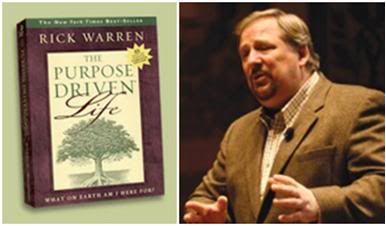 Rick Warren’s ‘The Purpose-Driven Life’:
Rick Warren’s ‘The Purpose-Driven Life’:
Arts and culture in the Bush era
By Lisa Miller

Published Dec 13, 2008
From the magazine issue dated Dec 22, 2008
When George W. Bush became president in 2000, he brought with him a kind of "hey, guy" Christianity that had been quietly booming in megachurches throughout the land.
It was neither the formal Episcopal worship of his youth nor the groovy pan-spirituality of lefty dabblers. Bush's faith was rooted in a Christian-conversion experience — and in the vernacular and ethos of the 12-step movement.
It was nurtured in "small groups," Bible-based social clubs that allowed men (or moms, or singles, or seniors) to speak up about their experiences. The Christianity that the younger Bush brought to the White House was casual and personal; it often resembled — if you didn't look too closely — self-help as much as religion. [ DIM]8pt[=DIM][This statement ignores the marked Christ-centeredness of these movements! It's not self-help, so much as helping yourself with and through the help of Christ.]
No book — indeed, no phenomenon — mirrors the Christianity of the middle Bush years better than The Purpose-Driven Life by Rick Warren, the pastor of California's Saddleback Church. Since 2002 it has sold more than 30 million copies worldwide, making it the bestselling nonfiction hardcover book in history.
At first glance it looks like "What Color Is Your Parachute?" for the 21st century. It's constructed like a self-help book, too: each chapter is a "unit," with quotations to contemplate and questions to ask yourself as you're falling asleep. The writing is easy-breezy, filled with slogans and exclamation points.
But the message is uniform and Christ-centered: if you give your life to God, God will show you the meaning of your life.
The book's success shows the joy so many found in that simplicity. Initially, Warren's own politics reflected those of the conservative evangelicals who were credited with electing Bush in 2004. It is perhaps no accident that as Bush's popularity headed south, Warren turned to other things: Darfur, AIDS, literacy, childhood illness.
During the election he took a visible but more nuanced role, hosting a debate on religion among the presidential candidates and opposing gay marriage in California. His own "purpose," it seems, was to turn his attention to the big, global problems with no easy answers.
|
 19/12/2008 23:43 19/12/2008 23:43 |
|
| | | OFFLINE | | Post: 16.025 | Registrato il: 28/08/2005
| Utente Gold | |
|
Avery Dulles, cardinal and Jesuit theologian
By Gary Stern

December 19, 2008
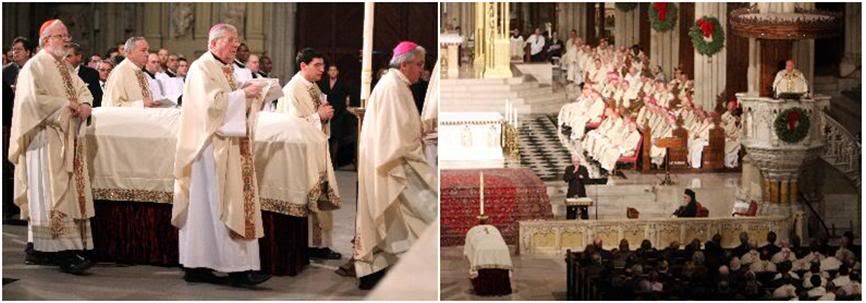
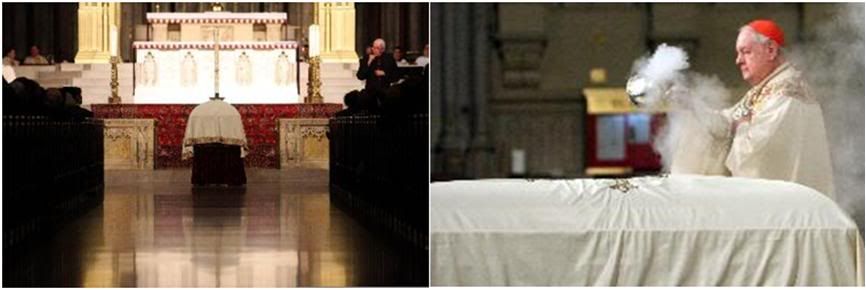 Photos from Lower Hudson Journal-News.
Photos from Lower Hudson Journal-News.
NEW YORK - Cardinal Avery Dulles - who once said that he preferred to spend his time reading, thinking, writing and teaching - might have been a bit embarrassed by all the fuss made about him since his death last Friday at 90.
Tributes to America's most famous and influential Roman Catholic theologian have been pouring in from around the world, the Rev. David S. Ciancimino, head of the New York Province of Jesuits, said yesterday at St. Patrick's Cathedral, where a Mass of Christian Burial was celebrated for Dulles.
"Cardinal Dulles was all they said he was - theologian, mentor, counselor," Ciancimino said. "He was, however, first and foremost, a man of the church. He insisted that he lived only to shine a light on the Lord who captured his heart."
Cardinal Edward Egan and five other U.S. cardinals, about 20 archbishops and bishops, dozens of Dulles' fellow Jesuits and hundreds of priests were among the many who came to St. Patrick's to honor a man who was born into an elite Protestant family of diplomats and became America's first and only theologian-turned-cardinal.
After the Mass, the congregation cheered as Dulles' casket was lifted and carried up the main aisle. A vast procession of cardinals, bishops and the rest streamed through the great doors of the cathedral and onto Fifth Avenue, where a crowd of tourists, shoppers and others stopped to watch a liturgical farewell to the theologian.
Some could be heard asking who had died.
Dulles had been suffering in recent years from the effects of post-polio syndrome. Although he was bed-ridden and unable to speak, he continued to write and work as the Laurence J. McGinley Professor of Religion and Society at Fordham University until his retirement earlier this year.
For most of his life, Dulles was an important figure to a relatively small circle of theologians and was happy to write 24 books and more than 800 articles while working quietly in his university offices.
Only after he was unexpectedly made a cardinal in 2001, a tribute to his life's work by Pope John Paul II, did Dulles become something of a Catholic celebrity.
His status as an elite intellectual of his church was cemented in April, when Pope Benedict XVI paid him a personal visit at St. Joseph's Seminary in Yonkers during the papal visit.
Benedict blessed the immobile Dulles and was presented with a collection of Dulles's lectures at Fordham.
"As the first and only American theologian to be named a cardinal, his writings and thinking became more significant," Monsignor Joseph Giandurco, pastor of Sacred Heart Church in Suffern, who studied under Dulles, said before the Mass.
"He was always respected as a Jesuit, but the esteem that Pope John Paul II had for him and that Pope Benedict XVI had for him are signs of his great intellect and his great faith.
"He was a wonderful model for people who sought to understand and explain the truth of the Catholic faith," Giandurco said. "For all his learning and intellect and the honors afforded him, he remained a humble priest."
In his warm homily, Egan recounted Dulles's fascinating life story. Dulles was the son of former Secretary of State John Foster Dulles, who served under President Dwight D. Eisenhower, and the nephew of Allen Dulles, CIA director from 1953 to 1961. The Dulleses were also prominent Presbyterians.
But Avery Dulles gave up his political connections and Protestant faith to convert to Catholicism, become a Jesuit and commit himself to a lifetime of study.
Egan talked about Dulles's suffering - from family consternation after his conversion and from physical pain from post-polio syndrome - and compared him to a crucifix that showed Christ's face in pain from one side and joyful from the other.
"We all feel his loss deeply," Egan said. "We will not forget his brilliance, kindness and generosity and, above all, his uncompromising devotion and loyalty to the Lord and the church he loved so much."
Egan described pushing Dulles's bed on wheels at a special Mass this past April for Dulles' 90th birthday.
Egan, who also suffered from childhood polio and limps from its effects today, said he leaned over Dulles and said: "I'm afraid it is a case of the lame pushing the lame."
Dulles smiled a smile of joy, Egan said.
The loss of Dulles is particularly painful for the Jesuits, who saw him as "an older, wiser brother," Ciancimino said.
Until illness slowed him down, Dulles still made his own breakfast and did his own laundry, Ciancimino said.
"He decorated the Christmas tree with us," he said.
After Communion, the congregation sang a famous Jesuit prayer, "Take, Lord, Receive," from the "Spiritual Exercises" of St. Ignatius Loyola.
For a modest cardinal,
a farewell full of majesty
By GLENN COLLINS

Published: December 18, 2008
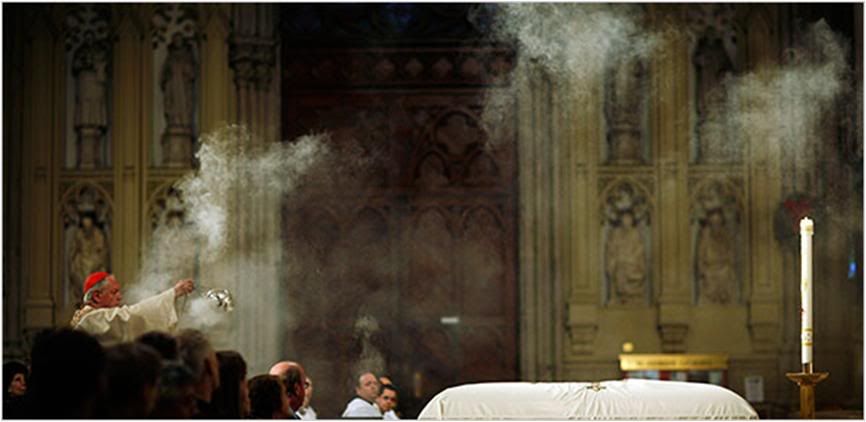
As it had to be, the majestic high Mass on Thursday for Cardinal Avery Dulles at St. Patrick’s Cathedral was an occasion of splendor and vivid remembrance for a soft-spoken cardinal who — though he wielded intellectual and moral influence as a Jesuit, a theologian and a writer — once said, “I’m not particularly made for ceremonies.”
The cardinal, the only American theologian ever appointed to the College of Cardinals, died last Friday at the age of 90 at Fordham University in the Bronx, where he had taught. He had “a triumphant life story,” said Cardinal Edward M. Egan of New York, who celebrated the nearly two-hour Mass.
As 750 mourners looked on, a stately rainbow assemblage of more than 150 church dignitaries, including six cardinals, moved in procession past Christmas wreaths and shimmering candles in the nave fragrant with incense. They passed the cardinal’s mortal remains in a coffin draped in a white pall — symbol of the joy of resurrection — and surmounted with a gold crucifix.
Then the bishops, abbots, archbishops and cardinals removed their white miters as they headed into the sanctuary, revealing a bobbing congregation of red and purple hats.
The journey of Cardinal Dulles to St. Patrick’s was unusual in that this son of diplomats and Presbyterians had been a convert to Roman Catholicism. And, when he was designated a cardinal in 2001 by Pope John Paul II, he was not a bishop or an archbishop, though his voice had been influential in American Catholicism.
The cardinal considered his scarlet hat an honorary one, since he was 82 at the time, two years past the voting age in electing a new pope. “The Jesuits loved him,” said the Rev. Ronald J. Amiot, an administrator at Loyola College in Maryland who was one of hundreds who paid respects to the cardinal during a three-hour wake in the St. Patrick’s Lady Chapel before the funeral Mass.
The cardinal, Father Amiot added, had been an inspiration to him when he was a seminarian and ever after because “he was a man who walked the walk, and lived what he believed.”
An elder statesman of Catholic theology in America, Cardinal Dulles, the son of John Foster Dulles — the secretary of state under President Dwight D. Eisenhower — was a professor of religion for two decades at Fordham.
“His extraordinary personal pilgrimage enabled him to be a great conciliator,” said the Rev. Joseph A. O’Hare, Fordham’s former president.
During the Mass, mourners, including members of the Dulles family, held program books and the St. Michael Hymnal as they sang “For All the Saints,” which echoed in the great nave. Speakers honored the cardinal’s priestly and academic career, which spanned five decades, during which he wrote 27 books and 800 articles.
Cardinal Dulles wrote in later years that he experienced a profound religious moment in February 1939, when, as an agnostic student at Harvard, he made the leap of faith.
He described his decision to convert to Catholicism as that of “one of those timid swimmers who closes his eyes as he jumps into the roaring sea.”
He shocked his family and friends the next year by converting. He joined the Society of Jesus in 1946 and was ordained as a priest in 1956.
Cardinal Dulles became a conservative theologian in an era of liturgical reforms and rising secularism, rallying to the defense of the pope against demands for change, and giving uncompromising loyalty to an American Church that had been wounded after covering up hundreds of cases of sexual abuse by priests and suffering the loss of tens of millions of dollars in lawsuits as a result.
Aside from his academic persona, Cardinal Dulles “was a priest’s priest,” said the Rev. David S. Ciancimino, the provincial, or head, of the New York Province of the Society of Jesus, terming him a modest man who “shunned the limelight.”
Cardinal Egan fondly recalled the years he had known the tall, self-deprecating Cardinal Dulles, whose angular face was often likened to that of a beardless Abraham Lincoln.
He said that Cardinal Dulles knew well the suffering of ordinary parishioners. Indeed, during the last phase of his life, due to the recurrence of the severe polio he contracted while he served in the Navy during the Second World War, Cardinal Dulles “was confined to a wheelchair and rendered unable to speak,” Cardinal Egan said.
After the Mass, the wan late-afternoon sun, which had returned for the day to Manhattan, made the church dignitaries’ miters and gold-threaded vestments gleam as the procession escorted the coffin down the steps to Fifth Avenue from the warm cathedral into the brisk afternoon and a waiting hearse. And spontaneously, the crowd of hundreds at the bronze doors applauded.
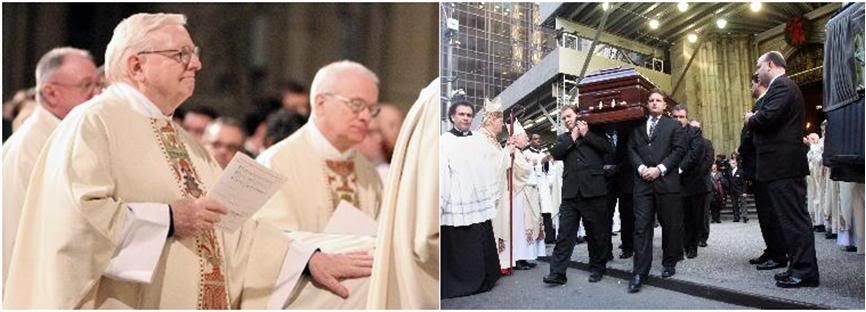 Cardinal Dulles remembered
Cardinal Dulles remembered
as 'priest's priest' at New York funeral
By Beth Griffin

NEW YORK, Dec. 19 (CNS) -- Cardinal Avery Dulles was remembered as a theologian, mentor, counselor and "a priest's priest" at his funeral Dec. 18 at St. Patrick's Cathedral in New York.
At the request of Pope Benedict XVI, Cardinal Edward M. Egan of New York was the principal celebrant of the Mass. Five other cardinals, 20 archbishops and bishops and more than 125 priests concelebrated.
Among the mourners were Archbishop Demetrios, primate of the Greek Orthodox Church in America, and representatives of ecumenical organizations.
Cardinal Dulles died Dec. 12 at the age of 90. Since 1988, he had been a professor of religion and society at Jesuit-run Fordham University in New York. In 2001, the Jesuit priest was the first American to be named a cardinal without first being a bishop.
Cardinal Egan, who was elevated by Pope John Paul II at the same consistory, said Cardinal Dulles's life story mixed triumph with suffering. He described a crucifix he saw as a seminarian in Umbria, Italy, that showed Christ's face as joyful or tortured, depending on the viewer's position. He said, "Death will always have two faces and neither should be ignored."
Cardinal Egan said Cardinal Dulles's triumphs included an unequaled career as an acclaimed American Catholic theologian and author of 23 books and more than 800 articles on "every aspect of theology."
He taught theology at colleges and seminaries in the United States and overseas, advised and wrote for departments at the Vatican and the U.S. Conference of Catholic Bishops and served as the president of both the Catholic Theological Society of America and the American Theological Society.
Cardinal Dulles was raised a Presbyterian in a prominent family noted for its public service. His father, great-grandfather and great-uncle served as secretary of state in three presidential administrations.
Cardinal Egan said Cardinal Dulles's conversion to Catholicism and his decision to seek the priesthood "entailed a certain measure of pain" in the reaction of his family.
His physical suffering related to polio he contracted during World War II. He recovered from the initial bout, but developed post-polio syndrome 20 years before he died and was paralyzed and unable to speak in recent months.
Cardinal Egan quoted from Cardinal Dulles's final lecture, delivered April 1, 2008, at Fordham University by Jesuit Father Joseph O'Hare, to describe Cardinal Dulles' acceptance of suffering:
"Suffering and diminishment are not the greatest of evils, but are normal ingredients in life, especially in old age. They are to be accepted as elements of a full human existence. Well into my 90th year I have been able to work productively. As I become increasingly paralyzed and unable to speak, I can identify with the many paralytics and mute persons in the Gospels, grateful for the loving and skillful care I receive and for the hope of everlasting life in Christ. If the Lord now calls me to a period of weakness, I know well that his power can be made perfect in infirmity. 'Blessed be the name of the Lord!'"
Cardinal Egan described pushing Cardinal Dulles into a 90th birthday Mass in August on a bed with wheels. Cardinal Egan, who walks with a limp because of polio, said he apologized to Cardinal Dulles if the procession was bumpy.
"I told him it was a case of the lame pushing the lame, and the smile that came across Cardinal Dulles's face was very similar to what I saw on the face of the crucifix a half-century earlier," he said.
Jesuit Father David J. Ciancimino, provincial of the New York province of the Society of Jesus, spoke at the end of the funeral Mass. He acknowledged the many tributes that called Cardinal Dulles a theologian, mentor and counselor, but said he was "first and foremost a man in service to the church, a man who shunned the limelight."
"To Jesuits, he was our older, wiser brother," who prepared his own breakfast, did his own laundry, decorated the Christmas tree and took his place in the Mass rotation in each place he lived, Father Ciancimino said. "He modeled the Jesuit life in genuine service."
Jesuit Father Drew Christiansen, editor-in-chief of America magazine, said Cardinal Dulles was a "theological communicator. He wrote in a way that most people could understand. He was a man for whom details were important. So often they're missed in the sound-bite (reporting) of today." [Sounds very much like one Joseph Ratzinger!]
He said Cardinal Dulles demonstrated how a scholar can hand on the Church tradition and refine the understanding of it for a contemporary audience.
Father Christensen said that commentators who try to label Cardinal Dulles have perhaps neglected his early writings. He said, "The sources of theology always escape precise articulation, because what we're drawing on is much greater than we can put into words."
Father James Massa, executive director of the USCCB Secretariat for Ecumenical and Interreligious Affairs, was a student of Cardinal Dulles. He said Cardinal Dulles was an encouraging, patient and pastoral mentor who encouraged him to study the ecclesiology of Cardinal Joseph Ratzinger, who later became Pope Benedict.
Father Massa said Cardinal Dulles's evolving theological position was "evidence of a real dynamism that took into account new realities in the Church."
As an example, he cited Cardinal Dulles' reflections on ecumenism. "Early on, he was more hopeful about the possibility of convergence on doctrinal matters, like the Petrine ministries, but later he was more sober about that," he said.
My question: Is there a practising American theologian today who is the heir to Avery Dulles's orthodox clarity and firmness?
An unpublished interview with Avery Dulles
All Things Catholic
by John L. Allen, Jr.

Friday, December 19, 2008
Tributes to Cardinal Avery Dulles, who died last week at the age of 90, have already been penned by people who knew him far better than I did, and who are in a much stronger position to assess his theological legacy. At that level, all I can add to what's already been written is "amen."
What I can contribute to the mix of remembrances, however, are the contents of a previously unpublished interview I had with Dulles two years ago, in October 2006, as part of the research for my forthcoming book on "Megatrends in Catholicism."
I had met Dulles in person only once before, in a spot not exactly conducive to forming deep bonds of intimacy. It was high atop the Jesuit curia building in Rome, overlooking St. Peter's Square, at the time of his installation as a member of the College of Cardinals in 2001. He had agreed to sandwich in a brief interview with me between scrums of TV crews. (To be honest, I think he did so only because his master of ceremonies for that string of events was his fellow New York Jesuit Fr. Keith Pecklers, a professor of liturgy in Rome and a mutual friend.)
Nonetheless, when I asked Dulles for an extended interview some five years later, he instantly recalled our meeting on that occasion - a touch of the legendary Dulles graciousness. He invited me to come out to his office on Fordham's Bronx campus to spend a leisurely fall morning talking about the future of Catholicism.
As things turned out, God called Dulles home before the book appeared, so this seems an appropriate moment to share what may have been among his last lengthy, forward-looking reflections.
* * *
I began by explaining the gist of my project, which is to identify the most important forces shaping the future of the Catholic church over the next 100 years.
Dulles did not hesitate to offer his candidate: "The internal solidification of Catholicism," he said, a project that Dulles said began under Pope John Paul II and continues under Pope Benedict XVI.
I pressed Dulles to explain what he meant.
" Restoring clarity where there had been confusion in the period following the Second Vatican Council," Dulles said.
"Rebuilding a strong sense of Catholic identity, including a clear repudiation of the notion that Church history can be divided into a 'before' and 'after' Vatican II. You can see this working itself out today in theology, in liturgy, in religious life … both Popes have emphasized the organic connection between the 'now' of the church and what came before."
Interestingly, Dulles hazarded the guess that this "internal solidification," as it plays out over the next half-century or so, might carry the Church back to different positions on some matters than those taken by the Popes who unleashed it.
Specifically, Dulles said, his hunch was that the Church may ultimately return to a "more traditional posture" on both the death penalty and the idea of a "just war."
Recent Popes, Dulles conceded, beginning with John XXIIII, seem to have taken quasi-abolitionist positions on both matters. Yet used sparingly and with safeguards to protect the interests of justice, Dulles argued, both the death penalty and war have, over the centuries, been recognized by the church as legitimate, sometimes even obligatory, exercises of state power. [I must confess I share this point of view completely - and it does not bother me to differ from the current Magisterium about both issues, because in both cases, what's at issue are actions of state, not any personal action I am ever going to take!]
The momentum of "internal solidification," he said, may lead to some reconsideration of these social teachings.
As a thought exercise, I challenged Dulles.
Let's assume, I said, that this internal solidification succeeds, and that 50 years from now ferment around questions such as women's ordination or the authority of the Pope is considered largely passé. {Allen's premise here is deliberately out of line, because Dulles specifically identified the issues he thought might revert to the traditional Magisterium - the death penalty and just war, not married priests and women priests!]
Nonetheless, given how big and complex the Catholic church is, it will always have a liberal wing. Might the steady closing of internal debates, I asked, have the unintended effect of shifting liberal Catholic energies from the ad intra to the ad extra realm - thereby reinforcing broadly progressive positions on social issues such as the death penalty and war?
That seems an especially tempting hypothesis, I suggested, since those stances appear to enjoy strong support among Catholics from regions such as Africa and Asia, which will be increasingly influential in the 21st century.
Dulles paused for a moment, and then said, "Well, I hadn't thought of it that way, but you could be right." At that stage, one could sense his mental wheels begin to turn, as Dulles tapped his capacity to find something commendable even in currents with which he disagreed.
If a new wave of ad extra energy should carry the Church towards greater activism around progressive social causes, Dulles said, it could also have the effect of better embodying Catholic teaching on the true nature of the role of the laity, which he described as being in the world rather than inside the Church.
"The lay vocation is primarily ad extra," Dulles said. "It's about being a Christian leaven in the world, evangelizing your own neighborhood, your own family, your profession, and your social contexts. There's not really a great deal of that being done."
In that regard, Dulles said he aligned with critics of the concept of "lay empowerment" that emerged after the Second Vatican Council, which often treats the lay role in terms of ad intra functions: a lector, Eucharistic minister, director of religious education, pastoral association, diocesan chancellor, and so on.
In the end, Dulles observed, only a tiny minority of lay Catholics will ever play one of those roles, however valuable they may be. For the vast majority of laity, the arena of their ministry will either be the secular world or nothing at all. [How refreshingly realistic and clear-sighted Cardinal Dulles was!]
In that light, Dulles said, "it would be a very good thing if the Church comes to see the model of an empowered lay person as someone doing something for the Gospel out in the world, rather than moving in the sacristy" - even if, he added with a smile, he might find some of that energy misdirected. [For more reason, one finds the idea of women priests weird! That's what these forward females want - 'empowerment', a political and secular goal, which they do not recognize as being, in this sense, an arrogant assertion of self, an offense against humility.]
I then pressed Dulles about another possible unintended consequence of "internal solidification."
In today's ecclesiastical politics, I suggested, proposals for internal reform are sometimes viewed with caution, not necessarily on their own merits, but out of fear that they may be a Trojan horse for a broader agenda of dissent.
Thus when a group such as "Voice of the Faithful" advocates more collaborative models of decision-making, some critics take that as a wedge in the door for a broader attack on the hierarchical structure of the church.
Might it be, I asked, that if internal solidification succeeds, a new climate will emerge in which some of these non-doctrinal reforms could get a more receptive hearing? In other words, is there a possible paradox: The more "conservative" the church becomes, the more open it might become to certain kinds of change?
"It very will might," Dulles said. "Of course, each proposal would have to be examined on its own merits, but you're right that sometimes these discussions are clouded by concern over where they might lead."
If bishops felt more secure that a strong sense of Catholic identity were not at risk, Dulles said, they might feel more inclined to "tinker" with some of the internal "machinery" of the Church.
Dulles added that in his experience, priests are usually among the first to support lay collaboration, "because it allows them to spend more time doing the things for which they were ordained - hearing confessions, celebrating the other sacraments, doing basic pastoral work."
We also discussed ecumenical and inter-religious dialogue, areas in which Dulles had long been a key Catholic participant. (Among other things, we spoke about the "Evangelicals and Catholics Together" initiative, put together by Fr. Richard John Neuhaus and Charles Colson. Noting that some young evangelicals he met through that work had since converted to Catholicism, Dulles joked, "If things keep going like that, we won't have anyone left to talk to!")
At the time we sat down, Dulles had recently brought out a revised edition of his 1971 book, A History of Apologetics. In it, Dulles makes the point that Christianity's original experts on Islam were neither impartial scholars nor specialists in inter-faith dialogue, but medieval apologists - writers from the 7th through the 14th centuries who articulated a strong defense of Christianity in light of Islamic critique.
I laid out my own take on what's happening. Since Vatican II, I suggested, Catholics have understood relations with the religious "other" almost exclusively in terms of dialogue. (As proof, the terms "inter-religious relations" and "inter-religious dialogue" are used almost interchangeably, rather than seeing "dialogue" as part of a broader approach that would also include apologetics and mission.)
In part, that's because our paradigm for inter-faith relations has been Judaism, and in the ecumenical field it's been the Orthodox - cases in which Catholics are often cast as the historical aggressor, and our instinct has been to atone.
Today, however, we're facing a new world. The paradigmatic inter-faith relationship is now with Islam, and the most dynamic force on the Christian scene is Pentecostalism. In both cases, Catholics, especially outside the West, are more likely to see themselves as victims rather than victimizers - of Islamic radicalism in some parts of the word, of Pentecostal proselytism in others.
For that reason, a growing number of Catholics, especially in the global South, are inclined to see relations with the religious "other" not exclusively in terms of atonement, but also self-defense.
Might that, I asked Dulles, stimulate a comeback for the lost art of apologetics?
"I think so, and in the West it's also influenced by secular critiques of religious belief, by the trivialization of faith itself," Dulles said. " For a while, we basically stopped teaching apologetics in the seminaries and in our universities, and that's left us somewhat vulnerable."
Dulles said requests to update his book on apologetics shows that interest in "the somewhat forgotten tradition of offering a reasoned defense of the faith, in light of contemporary objections," is growing.
He added that he's not sure writers such as Cardinal Juan Torquemada or Savonarola, both of whom figure in his book, necessarily offer the best models for contemporary apologetics, pointing instead to masters such as Augustine, Aquinas, Pascal and John Henry Newman.
He urged today's would-be apologists to learn from the past - both the distinctions worked out by previous generations, as well as the mistakes they made.
"If it's going to work, apologetics has to be deeply respectful of the positions of others, and it has to be clearly grounded in reason," Dulles said.
"We have to show that it is reasonable to believe, that faith isn't a purely subjective or emotional stance," Dulles said. "Then we can show that it's reasonable to believe what the Catholic Church teaches - without, of course, eliminating the element of mystery, as if every element of Christian faith can be proven like a geometric theorem."*
As we wrapped up, Dulles gave me his direct phone number and urged me to call "anytime." He also made me promise to send him a copy of the book when it appeared, something I regret that I now will not have the opportunity to do.
"Of course," he said as I was leaving, "I hope you're talking to plenty of people other than me. Don't take anything I say as Gospel!"
Then his final thought: "By all means, write the book," he said. " It's a good exercise to think about the future of the church. But it's even more important to pray about it, because neither you nor I really know what's going to happen."
* * *
My interview with Dulles came not long after Pope Benedict XVI's lecture at the University of Regensburg, and I asked the cardinal to offer some comments about Catholic/Muslim relations for my weekly column. That previously published portion of our interview can be found here: www.nationalcatholicreporter.org/word/pfw100606.htm
"Then we can show that it's reasonable to believe what the Catholic Church teaches - without, of course, eliminating the element of mystery, as if every element of Christian faith can be proven like a geometric theorem."
I find this a most relevant observation. Until I started to read and listen to Joseph Ratzinger, I had never before come across the word 'mystery' used so often by anybody when talking about the most basic elements of the Christian faith.
And of course, by definition, faith is mystery, it cannot be 'proven like a geometric theorem'. That is the literal meaning of accepting something 'on faith'. It is proven in other ways, especially in and through the lives of saints.
Personally, I believe because I believe, because I was taught to believe - it came with mother's milk, and fortunately, nothing I have learned since has damaged that faith; it has only strengthened it.]
[Modificato da TERESA BENEDETTA 21/12/2008 05:56] |
 25/12/2008 05:12 25/12/2008 05:12 |
|
| | | OFFLINE | Post: 3.501 | Registrato il: 23/11/2005
| Utente Master | |
|
Hong Kong cardinal, critical of China, to step down
By Mark McDonald
International Herald Tribune
Wednesday, December 24, 2008
Hong Kong: Cardinal Joseph Zen Ze-kiun, a sharp critic of China over democratic rights and religious freedoms, said Wednesday that the Vatican has agreed to his request to step down next year as the head of the Roman Catholic diocese in Hong Kong, news agencies reported.
He said he would spend more time monitoring Catholic churches in mainland China, according to The Associated Press, which quoted him as saying: "I do not retire to rest. The mainland Chinese church is huge and complicated. Sometimes the pope wants me to give him some advice, so I need more time to research it."
Zen, who turns 77 next month, had twice before asked to be relieved of his diocesan duties. Pope Benedict XVI, he said Wednesday, approved his latest request to step down.
Zen, who was born in Shanghai and fled to Hong Kong after the Chinese civil war, has led the diocese since 2002. Bishop John Tong Hon, 69, who was born in Hong Kong, has been designated as his likely successor.
The Roman Catholic diocese of Hong Kong has an estimated 250,000 members. Macao, the former Portuguese colony and China's other semiautonomous territory, has the only other Roman Catholic diocese in China.
Beijing and the Vatican have not had formal relations since Mao Zedong expelled the papal nuncio in 1951, two years after the Communist takeover. The relationship continues to be strained over the Holy See's recognition of Taiwan.
Mao created the Chinese Catholic Patriotic Association in 1957 to control the church on the mainland. It now has an estimated 7 million members. Several million more mainland Catholics worship in underground churches, according to religion scholars.
|
 26/12/2008 15:34 26/12/2008 15:34 |
|
| | | OFFLINE | | Post: 16.082 | Registrato il: 28/08/2005
| Utente Gold | |
|
South African cardinal calls
for total isolation of Zimbabwe's
‘obstinate Pharaoh’ Mugabe

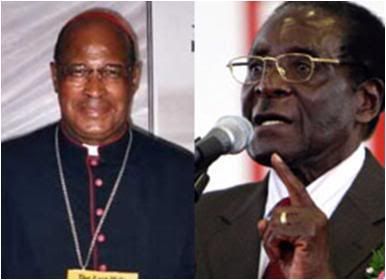
Johannesburg, Dec 19, 2008 (CNA) - Cardinal Wilfrid Napier, OFM, speaking for the Southern African Catholic Bishops' Conference, has called for relief for the humanitarian crisis in Zimbabwe and has asked that Zimbabwe President Robert Mugabe be isolated completely and deprived of support.
Comparing Mugabe to an obstinate Pharaoh, the cardinal archbishop of Durban on Thursday asked all African leaders to come to the aid of Zimbabwe. The country has suffered violence, food shortages and disease after civil conflict followed Mugabe's refusal to step down after the apparent electoral victory of his opponent Morgan Tsvangirai.
"We, the Catholic bishops of South Africa, Botswana and Swaziland, add our voice to the cries of those who insist that no effort must be spared in ensuring that a political solution to the current impasse is found," Cardinal Napier's statement began.
Saying that South Africa has a "crucial role" to play in advancing justice and peace in Zimbabwe, the cardinal said that the bishops are "deeply saddened" that eight years of mediation has "borne no fruit."
"These efforts were made in the hope that Robert Mugabe could be persuaded to negotiate with the opposition in the interests of the Common Good of the whole Zimbabwean nation," Cardinal Napier explained. "However, since he lost the election in March this year, he has continued to cling to power, waging war against anyone suspected of not supporting him, and refusing to share any real power with those who beat him in the election."
"It is clear that Mugabe is not prepared to relinquish control voluntarily, and that he is willing to watch thousands of innocent people die of starvation and cholera as long as he is able to retain power."
"Like Pharaoh he is obstinate and refuses to listen to the people," the cardinal said, referencing the Book of Exodus.
He reported that the bishops were "extremely disappointed" in the failure of the South African Development Community leadership, including the South African president, to relieve the situation. Cardinal Napier called attempts to blame all sides in Zimbabwe's conflict "a travesty of justice and truth."
He said that Zimbabwe's opposition party has made "major concessions" not reciprocated by Mugabe and his ruling ZANU party, which "must bear total responsibility for the current impasse."
"It is now time to isolate Mugabe completely and to remove all forms of moral, material or tacit support for him and his party," he said.
Referring to descriptions of Mugabe as a "liberator" or an "Elder African Statesman," he added: "No true liberator or statesman clings ruthlessly to power, as Mugabe has done, while his people live and die in misery and destitution. No solution to the crisis in Zimbabwe is possible as long as he is there."
Rebuking African leaders who believe they are defending Mugabe against "the supposed machinations of former colonial and present imperial powers," Cardinal Napier called on them to re-direct their solidarity to the needs of the suffering people of Zimbabwe.
"The South African Government has the capacity to force Mugabe to go. All that is lacking is the political will," the cardinal argued. "We therefore call on President Motlanthe to stop immediately all collusion with Mugabe and to cut off any life-blood that South Africa is offering him," he said, calling for electricity and fuel supplies to be severed and for the assets of Zimbabwean leaders to be frozen.
Cardinal Napier then concluded the statement of the Southern African Catholic Bishops' Conference, saying: "We express our deepest solidarity with the people of Zimbabwe at this desperate time. We recommit ourselves and our people to praying that they will be able to unite and to have the courage and the strength to persevere in the struggle to remove the evil brought on them by Mugabe's dictatorship and the armed forces he uses to enforce it."
I hope TIME's Jeff Israely has noted this CNA report.
Bishop Napier and the South African bishops have done right in speaking up against Mugabe again at this time, and it is to be hoped other African bihops will put a concerted pressure on their governments to act in Zimbabwe.
Israely had suggested in his write-up on the Pope's Curia address that he would have done better denouncing people like Mugabe in his speech instead of reaffirming Catholic doctrine the way he did!
|
 30/12/2008 00:31 30/12/2008 00:31 |
|
| | | OFFLINE | | Post: 16.109 | Registrato il: 28/08/2005
| Utente Gold | |
|
One of the many Christmas Day stories I missed, but I'm posting this report by his hometown newspaper for the record.
Obama and family choose
to miss church on Christmas
Aide says new first family
didn't want security
to intrude on the public
By JOHN MCCORMICK

Dec. 25, 2008
HONOLULU — Barack Obama has long stressed the importance of religion in his life.
But as his fellow Christians around the world attended Christmas services on Wednesday and Thursday, the president-elect and his family remained sequestered at their vacation compound on the windward coast of Oahu.
His lack of attendance at formal religious services was obvious and showcased a dilemma faced by Obama, who is between churches and often also expresses concern about bringing the disruption of his security detail into the lives of others.
Still, he has not attended a public church service since before being elected, a departure from the actions of his two immediate predecessors.
"The president-elect didn't want to disrupt a church community on Christmas with the burdens that come with a presidential visit," Obama spokesman Ben LaBolt said Thursday.
Aides said the Obama family celebrated Christmas Day by opening presents at their vacation rental compound in Kailua. Dinner included turkey and ham.
Earlier this week, Obama did visit a church when he attended a private memorial service for his grandmother, who died less than two days before the election at the age of 86.
The service for Madelyn Dunham was held at the First Unitarian Church, a congregation here that made national news in 1969 when it offered sanctuary to dissident servicemen protesting the Vietnam War.
In a Chicago Tribune interview this month, Obama said his family plans to find a home church in Washington, although no selection has yet been made.
"We frankly haven't thought about it yet because right now we're just trying to make sure that we don't lose anything in the move, including our children," he said.
[What's wrong with the church across the street from the White House which both Presidents Bush and President Clinton attended even if they do not belong to tis denomination?]
|
 31/12/2008 15:39 31/12/2008 15:39 |
|
| | | OFFLINE | | Post: 16.120 | Registrato il: 28/08/2005
| Utente Gold | |
|
SAY A PRAYER
FOR FATHER NEUHAUS
Father Neuhaus Hospitalized
by Tom McFeely

Tuesday, December 30, 2008 4:42 PM
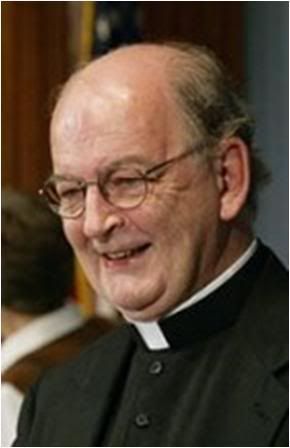
Father Richard John Neuhaus, editor in chief of First Things, is currently undergoing treatment for cancer in Manhattan’s Sloan-Kettering Cancer Center.
Father Neuhaus disclosed his cancer at the end of this post on the First Things website in early December.
The Daily Blog spoke today with pro-life advocate Chris Slattery, who visited Father Neuhaus yesterday afternoon at the hospital.
“I got a call yesterday morning from his office, saying that he was put in on the weekend and please go visit him,” said Slattery, who is founder and president of Expectant Mother Care.
Said Slattery, “He’s clearly had a serious recurrence of a new cancer. It’s going to require some immediate chemotherapy. He was in a lot of pain.”
Slattery said that Father Neuhaus could speak only a few words during their visit because he was heavily sedated in order to help him regain strength prior to undergoing chemotherapy.
“And for a man of that intellect, it’s just torture for him to be unable to really communicate,” said Slattery, who noted that Father Neuhaus was hospitalized several years earlier for the successful treatment of another cancer.
“I think what he’s got is a non-Hodgkin’s lymphoma which is completely unrelated to the previous cancer he had some ten years ago, which was a colon cancer,” Slattery said. “He wrote a book about his experiences — I visited him in the hospital then too — he was near death with that cancer. He wrote a book called, ‘As I Lay Dying,’ which describes his mental state as he was going through that treatment. It’s a very edifying book. It’s a good time for people to check back on that book.”
Staff from First Things as well as his sister from Valparaiso, Indiana, are visiting with Father Neuhaus while he’s in hospital, said Slattery.
Slattery is optimistic about Father Neuhaus’s prognosis.
“My mother, my father and I have all been treated for cancer in that same hospital, Sloan-Kettering,” he said. “He’s got top care there. They’re going to give him the best treatment he can get in the world there.”
Added Slattery, “I just don’t think it’s his time, the Church really needs him. He’s one of the most brilliant churchmen we have. He’s been named one of the 100 most influential Americans by U.S. News & World Report, and in my book he’s one of the top two or three priests in the country in his understanding of the Church and the faith, intellectually and theologically.”
Said Slattery, “So we have to pray for him.”
[Modificato da TERESA BENEDETTA 31/12/2008 15:39] |
 01/01/2009 18:30 01/01/2009 18:30 |
|
| | | OFFLINE | | Post: 16.140 | Registrato il: 28/08/2005
| Utente Gold | |
|
Monk changes his mind after
agreeing to be next
Archbishop of Westminster
By Simon Caldwell

January 1, 2009
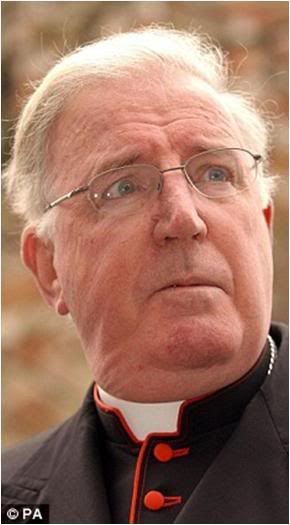
A monk chosen by Pope Benedict XVI to be the next leader of the Roman Catholic church in England and Wales has declined the post at the last minute, it emerged last night.
Dom Hugh Gilbert, the Abbot of Pluscarden Benedictine Abbey in Scotland, had originally said he would be happy to succeed Cardinal Cormac Murphy-O'Connor as Archbishop of Westminster.
But then one of his key aides left the abbey - after falling in love with a woman.
Worried that his monastic community would break up, Dom Hugh told the Pope he had changed his mind.
Cardinal Murphy-O'Connor, 76, who wants to retire in the next three months, is said to be 'furious' that the abbot has snubbed the Pope.
The Vatican had been due to announce Dom Hugh's appointment tomorrow.
It remains to be seen if the Pope will begin the search for a new candidate or whether he will order Dom Hugh, 55, to accept a promotion that would see him becoming England's next cardinal.
The Pope is said to have wanted to appoint Dom Hugh, a convert from the Church of England, because he is keen to break the stranglehold of liberal-minded bishops on the English Catholic Church.
The English bishops have, for instance, generally opposed the Pope's efforts to return Latin worship into churches. Last month they also called for Muslim prayer rooms in every Catholic school.
Dom Hugh is considered by the Vatican to be an orthodox and holy man who would approach such issues from a more traditional perspective.
A Londoner, he was educated at St Paul's school and King's College London. He became a monk in 1974.
Dom Hugh had been a comparative outsider for the post at 8-1 with bookmakers Paddy Power.
He trailed behind the 7-4 favourite Vincent Nichols, the Archbishop of Birmingham, and Archbishop of Cardiff Peter Smith, at 3-1, who was favoured by the Pope's ambassador to Britain, Archbishop Faustino Sainz Munoz.
Dom Hugh was unavailable for comment last night.
Damian Thompson is skeptical of the Mail report:
Has Abbot Hugh Gilbert turned down Westminster?

January 1, 2009
The Mail reports an amazing rumour - and it is only a rumour at this stage - that Dom Hugh Gilbert, Abbot of Pluscarden in Scotland, has turned down the Pope's invitation to become Archbishop of Westminster because he is worried that his community will break up without him.
According to Simon Caldwell, Cardinal Cormac Murphy-O'Connor is "furious" with Abbot Hugh, a 55 year-old English convert from Anglicanism, for backing out shortly before the Vatican was due to announce his appointment tomorrow.
There is more to this story than meets the eye. I know that it emanates from a source close to the Cardinal, which makes me suspicious. Here are some thoughts.
1. If Hugh Gilbert has turned down the job, he may be persuaded to think again; it happens quite often. (The late Cardinal Lustiger didn't want go to Paris, for example.) Is someone trying to make sure he doesn't change his mind?
2. If +Cormac is furious, what is he furious about? The abbot's decision, apparently prompted by a scandal that has damaged morale in his community? Or the Pope's wish to offer Westminster to a complete outsider, thereby signifying his low opinion of the English and Welsh hierarchy, most of whom reflect the Cardinal's view of the world?
3. The offer to Hugh Gilbert (which I am assuming was indeed made) means that any other Archbishop of Westminster will be the Pope's second choice. Significantly, he will take office knowing that Benedict XVI wants a break with the past. Even if he comes from the Magic Circle, he will be expected to dismantle its politically correct, back-slapping machine politics.
4. Keep in mind the name of Cardinal George Pell of Sydney - not for Westminster (that's just silly) but as a prime mover in this affair. We've known for a long time that Cardinal Pell is an admirer of the self-effacing but rigorously orthodox Abbot Gilbert - and also regards the current Bishops of England and Wales as second-raters. Which indeed most of them are.
Anyway, even if the chosen man has declined the Pope's offer - and what a pity if he has - we can't rule out an announcement tomorrow. One way or another, the era of the Magic Circle is drawing to a close.
[Modificato da TERESA BENEDETTA 01/01/2009 18:59] |
 04/01/2009 16:11 04/01/2009 16:11 |
|
| | | OFFLINE | | Post: 16.171 | Registrato il: 28/08/2005
| Utente Gold | |
|
German professor hired
for outreach to Muslims
delivers a jolt: He says
it's likely Muhammad never existed
by Andrew Higgins

Nov. 15, 2008
My day for catching up a bit on things ignored, neglected or overlooked. On 12/13/08, I posted a November essay by Asia Times's Spengler in REFLECTIONS ON ISLAM
freeforumzone.leonardo.it/discussione.aspx?idd=354785&p=14
entitled 'Scandal exposes Muslim weakness: Did Muhammad really exist?'
The wonder is that I have not seen other Anglophone commentaries about the issue (not even the otherwise ever-vigilant John Allen), first brought to the attention of the English-speaking world by the Wall Street Journal in this article. One would have expected a tremendous outcry from Muslims (and the following article makes it clear there was, at least in Europe, among academes and theologians) - and for this to be reflected in the Anglophone media somehow.
Here is the original WSJ article about it, presented as a profile of the man behind the startling hypothesis. As Prof. Kalisch teaches at Muenster, one of the universities where Prof. Joseph Ratzinger taught, I am tempted to speculate whether there has been any correspondence bteween he Holy Father and Kalisch about this!
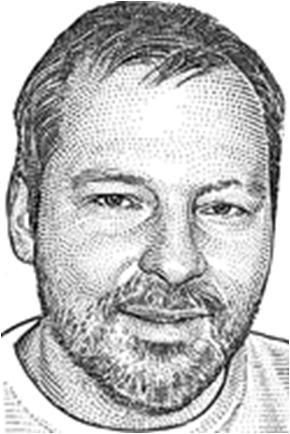
MÜNSTER, Germany -- Muhammad Sven Kalisch, a Muslim convert and Germany's first professor of Islamic theology, fasts during the Muslim holy month, doesn't like to shake hands with Muslim women and has spent years studying Islamic scripture. Islam, he says, guides his life.
So it came as something of a surprise when Prof. Kalisch announced the fruit of his theological research. His conclusion: The Prophet Muhammad probably never existed.
Muslims, not surprisingly, are outraged. Even Danish cartoonists who triggered global protests a couple of years ago didn't portray the Prophet as fictional. German police, worried about a violent backlash, told the professor to move his religious-studies center to more-secure premises.
"We had no idea he would have ideas like this," says Thomas Bauer, a fellow academic at Münster University who sat on a committee that appointed Prof. Kalisch. "I'm a more orthodox Muslim than he is, and I'm not a Muslim."
When Prof. Kalisch took up his theology chair four years ago, he was seen as proof that modern Western scholarship and Islamic ways can mingle -- and counter the influence of radical preachers in Germany.
He was put in charge of a new program at Münster, one of Germany's oldest and most respected universities, to train teachers in state schools to teach Muslim pupils about their faith.
Muslim leaders cheered and joined an advisory board at his Center for Religious Studies. Politicians hailed the appointment as a sign of Germany's readiness to absorb some three million Muslims into mainstream society.
But, says Andreas Pinkwart, a minister responsible for higher education in this north German region, "the results are disappointing."
Prof. Kalisch, who insists he's still a Muslim, says he knew he would get in trouble but wanted to subject Islam to the same scrutiny as Christianity and Judaism.
German scholars of the 19th century, he notes, were among the first to raise questions about the historical accuracy of the Bible.
Many scholars of Islam question the accuracy of ancient sources on Muhammad's life.
The earliest biography, of which no copies survive, dated from roughly a century after the generally accepted year of his death, 632, and is known only by references to it in much later texts. But only a few scholars have doubted Muhammad's existence. Most say his life is better documented than that of Jesus.
"Of course Muhammad existed," says Tilman Nagel, a scholar in Göttingen and author of a new book, Muhammad: Life and Legend. The Prophet differed from the flawless figure of Islamic tradition, Prof. Nagel says, but "it is quite astonishing to say that thousands and thousands of pages about him were all forged" and there was no such person.
All the same, Prof. Nagel has signed a petition in support of Prof. Kalisch, who has faced blistering criticism from Muslim groups and some secular German academics.
"We are in Europe," Prof. Nagel says. "Education is about thinking, not just learning by heart."
Prof. Kalisch's religious studies center recently removed a sign and erased its address from its Web site. The professor, a burly 42-year-old, says he has received no specific threats but has been denounced as apostate, a capital offense in some readings of Islam.
"Maybe people are speculating that some idiot will come and cut off my head," he said during an interview in his study.
A few minutes later, an assistant arrived in a panic to say a suspicious-looking digital clock had been found lying in the hallway. Police, called to the scene, declared the clock harmless.
A convert to Islam at age 15, Prof. Kalisch says he was drawn to the faith because it seemed more rational than others. He embraced a branch of Shiite Islam noted for its skeptical bent.
After working briefly as a lawyer, he began work in 2001 on a postdoctoral thesis in Islamic law in Hamburg, to go through the elaborate process required to become a professor in Germany. [The famous Habilitation!]
The Sept. 11 attacks in the U.S. that year appalled Mr. Kalisch but didn't dent his devotion. Indeed, after he arrived at Münster University in 2004, he struck some as too conservative.
Sami Alrabaa, a scholar at a nearby college, recalls attending a lecture by Prof. Kalisch and being upset by his doctrinaire defense of Islamic law, known as Sharia.
In private, he was moving in a different direction. He devoured works questioning the existence of Abraham, Moses and Jesus. Then "I said to myself: You've dealt with Christianity and Judaism but what about your own religion? Can you take it for granted that Muhammad existed?"
He had no doubts at first, but slowly they emerged. He was struck, he says, by the fact that the first coins bearing Muhammad's name did not appear until the late 7th century -- six decades after the religion did.
He traded ideas with some scholars in Saarbrücken who in recent years have been pushing the idea of Muhammad's non-existence. They claim that "Muhammad" wasn't the name of a person but a title, and that Islam began as a Christian heresy.
Prof. Kalisch didn't buy all of this. Contributing last year to a book on Islam, he weighed the odds and called Muhammad's existence "more probable than not."
By early this year, though, his thinking had shifted. "The more I read, the historical person at the root of the whole thing became more and more improbable," he says.
He has doubts, too, about the Quran. "God doesn't write books," Prof. Kalisch says.
Some of his students voiced alarm at the direction of his teaching. "I began to wonder if he would one day say he doesn't exist himself," says one. A few boycotted his lectures. Others sang his praises.
Prof. Kalisch says he "never told students 'just believe what Kalisch thinks'" but seeks to teach them to think independently.
Religions, he says, are "crutches" that help believers get to "the spiritual truth behind them." To him, what matters isn't whether Muhammad actually lived but the philosophy presented in his name.
This summer, the dispute hit the headlines. A Turkish-language German newspaper reported on it with gusto. Media in the Muslim world picked up on it.
Germany's Muslim Coordinating Council withdrew from the advisory board of Prof. Kalisch's center. Some Council members refused to address him by his adopted Muslim name, Muhammad, saying that he should now be known as Sven.
German academics split. Michael Marx, a Quran scholar at the Berlin-Brandenburg Academy of Sciences, warned that Prof. Kalisch's views would discredit German scholarship and make it difficult for German scholars to work in Muslim lands.
But Ursula Spuler-Stegemann, an Islamic studies scholar at the University of Marburg, set up a Web site called solidaritymuhammadkalisch.com and started an online petition of support.
Alarmed that a pioneering effort at Muslim outreach was only stoking antagonism, Münster University decided to douse the flames. Prof. Kalisch was told he could keep his professorship but must stop teaching Islam to future school teachers.
The professor says he's more determined than ever to keep probing his faith. He is finishing a book to explain his thoughts. It's in English instead of German because he wants to make a bigger impact. "I'm convinced that what I'm doing is necessary. There must be a free discussion of Islam," he says.
Almut Schoenfeld in Berlin contributed to this article.
WSJ published alongside the ff. translated excerpt from Prof. Kalisch's paper:
 Theology Without Muhammad
Theology Without Muhammad
from
"Islamic Theology Without the Historic Muhammad -
Comments on the Challenges of
the Historical-Critical Method for Islamic Thinking"
by Muhammad Sven Kalisch
University of Muenster
Up to some time ago I was convinced that Muhammad was a historical figure. Although I always based my thinking on the assumption that the Islamic historical narrative regarding Muhammad was very unreliable, I had no doubts that at least the basic lines of his biography were historically correct.
I have now moved away from this position and will soon publish a book in which I will, among other things, comment on this question and explain my arguments in more detail.
This essay is only a short summary of my most important arguments. It also deals with the question of what implications historical-critical research has for the Islamic theory and how I deal with my research results as a theologian.
With regard to the historical existence of Muhammad ... I consider my position simply as a continuation of the most recent research results. It appears so spectacular only because it has been said by a Muslim ...
Most Western scientists turn down such an hypotheses out of respect for Islam or because they are afraid of the reactions of their Muslim friends or because they think it is speculative nonsense.
The word "respect" sounds wonderful but it is completely inappropriate here because one really refers to the opposite. Whoever thinks that Muslims can't deal with facts puts Muslims on the same level as small children who can't think and decide for themselves and whose illusions of Santa Claus or the Easter Bunny one doesn't want to destroy.
Whoever really bases his thoughts on the equality of all human beings must expect the same intellectual performance. Really treating Muslims with respect would imply that they are strong enough to deal with their religion on the basis of our modern level of knowledge.
"Islamophobes" think we Muslims are barbarians, the "kind-hearted" take us for "noble savages"... The result is the same: Muslims are seen as different from the rest of the world -- they either belong in a "petting zoo" or in cages for wild animals, but by all means they belong in a zoo.
The final argument is even more awful because it can only be described as cowardly.
Religious fundamentalists are spreading out (not only Islamic fundamentalist) and freedom of thought must be defended no matter what. There must not be any compromise on this otherwise we set the track for a retreat into the Middle Ages and this can happen much faster than many people think.
My position with regard to the historical existence of Muhammad is that I believe neither his existence nor his non-existence can be proven. I, however, lean towards the non-existence but I don't think it can be proven.
It is my impression that, unless there are some sensational archeological discoveries -- an Islamic "Qumran" or "Nag Hammadi" -- the question of Muhammad's existence will probably never be finally clarified.
The entire 30-page essay (in PDF format) in German can be found on
www.uni-muenster.de/imperia/md/content/religioesestudien/islam/_v/kalisch_islamische_theologie_ohne_historischen_muha...
I haven't had the chance to read through it myself.
A reader of Spengler is translating the essay in installments, and has published two so far on Spengler's Forum:
spengler.atimes.net/viewtopic.php?t=11941
[Modificato da TERESA BENEDETTA 04/01/2009 16:33] |
|
|
|
|